#the fact the they had the robber baron character say this...
Explore tagged Tumblr posts
Text
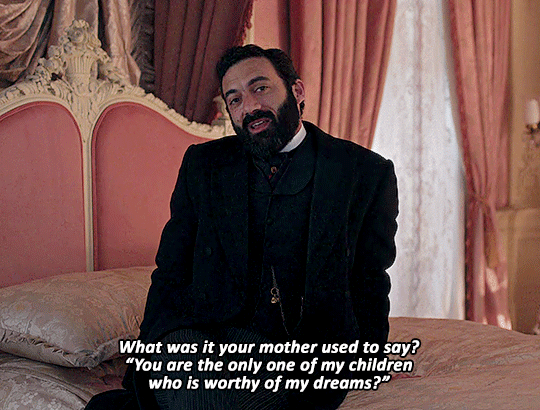
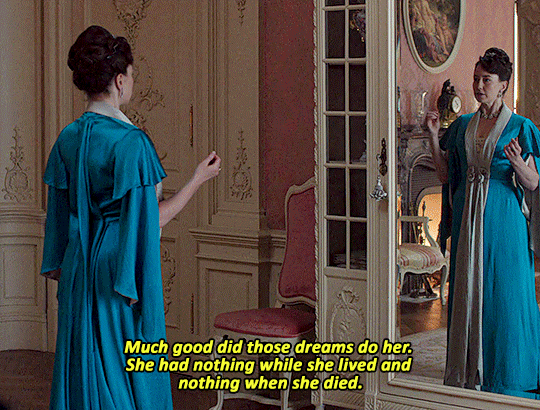
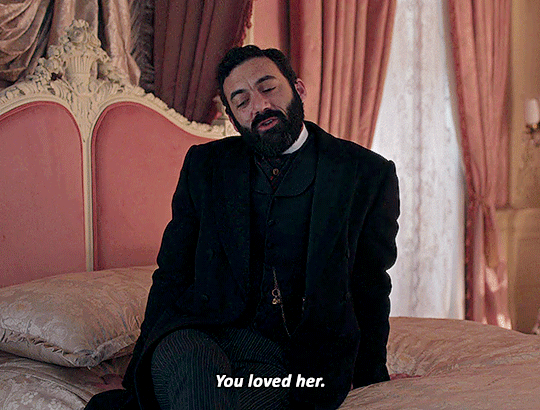
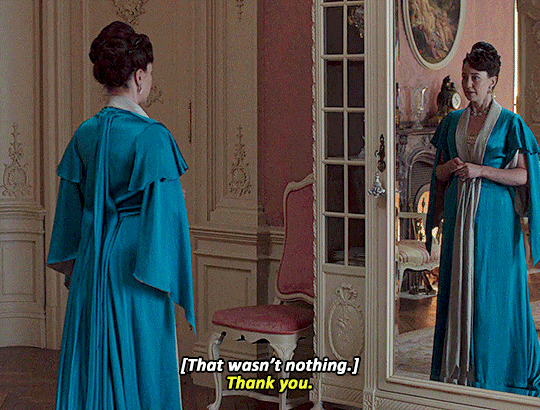
Don't you think she'd be proud of you this evening?
THE GILDED AGE (2022- ) | 1.01 "Never the New"
#the gilded age#thegildedageedit#thegildedagesource#perioddramaedit#perioddramasource#weloveperioddrama#onlyperioddramas#gifshistorical#periodedit#*mine#carrie coon#bertha russell#morgan spector#george russell#this moment makes me so emotional#the fact the they had the robber baron character say this...#how can you not ship them after that
703 notes
·
View notes
Text
Kinda loving the labor union plotline in The Gilded Age, which is not something I expected to say about a show that in season one had a whole episode devoted to the British method of table setting. Some spoilery musings under the cut…
My one quibble at first was that they were shying away from the brutality of the early efforts to stop labor disputes but then I realized:
1) this is not a show whose tone jibes well with honest depictions of historical violence. Last week’s attempt to show the frequencies of lynchings in Gilded Age Alabama had a weird tonal whiplash, even for a Julian Fellows show. Probably better not to go down that path!
2) George Russell is possibly the one gilded age robber baron— as the show shows his character— who would decide at the last minute he can’t bring himself to fire on striking workers because:
a) his method of strong arming people into doing what he wants is to talk them into it and fling money at the problem. When those don’t work he flounders and has a rare moment of self-doubt. The fact that he has to resort to physical violence clearly has him questioning his abilities and feeling deeply wrong. He wants to make the world bow to him through the force of his rhetoric.
b) he’s extremely out of touch (why aren’t the union leader’s kids in school, and instead also working at the mill?? Could it be that you created a company town Mr. Russell??? Could it be the poverty???) but… he’s also a self-made man, so seeing the actual conditions of his workers might actually make him change his mind
c) he’s utterly devoted to his family, to the tune of paying millions for an opera house and essentially kidnapping the director of the opera just so his wife (who hates opera) can get the box she wants. Seeing that his big enemy has a wife he ALSO loves, and children he protects probably struck a chord and threw him. I do think the big turning point for George was seeing the labor union leader push his son physically behind him, to protect him
I also got a real kick of Patrick “That’s Why We Build the Wall” Pagebooming out in a deep bass that they must fire on the striking workers or the whole social order would collapse. Not sure why this man has become The Character Actor to represent the Evils of Capitalism, but he does a great job of it!
30 notes
·
View notes
Text

ASSORTED HEADCANONS — Milo James Thatch
When I first started writing as Milo, I wanted to pursue a holistic approach to his character that actively took into careful consideration the turbulent time period in which he lived. Here are some of the headcanons I’ve come up with him, to give y’all a better picture of my portrayal.
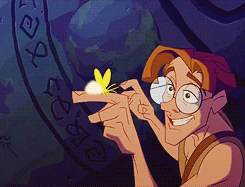

Growing up in GILDED AGE AMERICA had an enormous impact on Milo's character, and plays a distinct role in determining the course of his reaction to Rourke's betrayal. During this time period, "ROBBER BARONS" such as J.P. Morgan, Andrew Carnegie, and John D. Rockefeller ruled with an iron fist over their respective industries, flaunting their wealth and prioritizing profit over people in order to get ahead. Rourke's plan surely would have eerily reminded Milo of the greed exhibited by these individuals, heightening his aversion beyond the fierce desire to protect Atlantis and her people. The negative consequences of AMERICAN CAPITALISM were on full display as Milo came of age, and it is this that enables him to so clearly predict the mechanisms through which Rourke would weaponize Atlantis's material and spiritual resources.
Milo is incredibly SUPERSTITIOUS, and has been this way for the vast majority of his life. Many of these superstitions were instilled in him by his grandfather Thaddeus, but his firm belief in the concept that breaking a mirror brings bad luck comes directly from personal experience. Shortly before he was due to give a major presentation on Atlantis to the museum board, he accidentally broke a handheld mirror by dropping it on the floor — and the presentation was a failure.
Milo's grandfather, Thaddeus, was a veteran of the American Civil War. He was called to serve in the Union Army due to the Conscription Act of 1863, and subsequently joined the ranks of the men fighting alongside ULYSSES S. GRANT in Vicksburg, Mississippi. Thaddeus fought alongside Grant for the rest of the war, including APPOMATTOX. Milo grew up knowing of his grandfather's military service; however, Thaddeus rarely, if ever, spoke of his experiences on the battlefield. He once met the former General Grant at the age of five years old, but barely remembers it because of how young he was at the time. What he does remember, however, is witnessing firsthand the effects of trauma from war wrought upon his grandfather. As such, Milo has developed a profound fear of war & bloodshed and will strive to keep peace at all costs.
Thaddeus once attempted to take Milo horseback riding in the Appalachian Mountains; however, to say that this did not go well is an understatement. Milo returned home with several broken bones and a lifelong aversion to equestrian activities.
Milo exhibits numerous characteristics that, when considered collectively, would result in a modern day diagnosis of AUTISM SPECTRUM DISORDER. Milo's characterization in the film suggests that his SPECIAL INTEREST is the lost kingdom of Atlantis, and he "infodumps" to the expedition's crew numerous times throughout their journey. As exhibited by his difficulty to befriend his fellow adventurers, Milo finds social situations challenging; he is a LITERAL thinker who struggles to understand the subtle rules of etiquette that govern group dynamics. SOCIAL CUES, such as Kida's ceaseless flirting, fly right over his head, making him entirely oblivious to Kida's affections. His affliction of TIME BLINDNESS demonstrated in the very first scene of the movie and made possible by POOR TIME MANAGEMENT skills, is also evident of Autism.
Although Milo pretended otherwise — unable to stomach the fact that he was upset over the loss of friendship with a man who so callously put profit over lives — Rourke’s betrayal STUNG. For many years, lingering emotions over Rourke's status as a turncoat haunted Milo, and this tragic fact became his deepest, darkest secret. Not even Kida, who is able to read Milo like an open book, suspects that the emotional damage wrought by Rourke cuts so deeply. Milo values loyalty to friends and family above all else, and the experience with Rourke was the very first time he ever witnessed someone blatantly disregard one of his core values.
When he needs to think, Milo will take a walk on the beach at Long Island Sound. Oftentimes, this endeavor will instead lead to him getting distracted by acquiring seashells to add to his already extensive collection.

#as an A.utistic individual myself I see a LOT of my own characteristics in Milo#rip M.ilo T.hatch you would’ve loved an A.utism diagnosis#╭ ⁞ ❏. muse headcanons.#long post tw
11 notes
·
View notes
Text
Idola specus
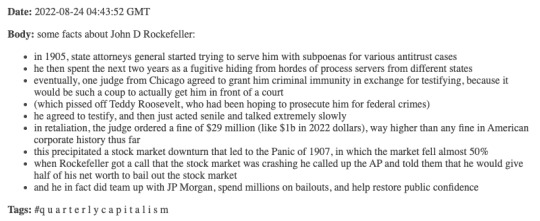
Dear Caroline:
My first impression when reading this post was to sadly nod my head and to think how badly the stereotypical Robber Baron could be as a role model, and what it might have said of your mental state just at the time that you had become the sole CEO of Alameda, and painfully aware of the very high risks of everything crashing down at any moment in just the way that it happened. But one should be wary of easy narratives and first impressions, as we are very commonly deluded by our own idols in the cave of ourselves.
As a non-American and ex-Marxist, the little I know about Rockefeller is completely negative (when I was a child we even had this puppet show on TV where one of the characters was a raven-capitalist with a top hat and a greedy nature that shared John D.'s surname). After taking a look at his wikipedia entry, he appears as a much more interesting and nuanced character. In some ways, he looks like the first Effective Altruism, following John Wesley's dictum of "gain all you can, save all you can, and give all you can" and spending in some pretty unglamorous areas like the hookworm eradication campaign. And he also looks like the example of the self-made man pulling himself up by his bootstraps. And this is not incompatible with being a social darwinist, ruthless, unscrupulous and greedy. Humans are complicated beings, and fall into many shades of gray. Of course, being a utilitarian you would be predisposed to a more essentially charitable look on him as the generator of tons of EV, both as a wildly successful entrepreneur and as a rich and generous philanthropist.
Something still makes we wary, though, as you made a choice to highlight here what were basically John D. Rockefeller's conflicts with the law for some very clearly shady practices, and this feels like too much foreshadowing -perhaps at a subconscious level- of the first impressions I mentioned at the start of these lines. Then again, even if I am a very deontologically inclined person, I am aware that success in the world very often comes from 'fake it till you make' and sometimes downright illegal actions, and that in a big percentage of cases, this goes undiscovered and/or covered up by success. Ultimately, you could say that this comes again to the crux of what you prioritize, and to what percentage, in your Heart of Hearts. But stepping aside of the Gordian knot, and still within a utilitarian framework, it seems to be a well-proven fact that breaking the rules for the greater good more often than not ends up badly for the rule-breakers, whatever impression the successful outliers might create.
Quote:
I was early taught to work as well as play, My life has been one long, happy holiday; Full of work and full of play— I dropped the worry on the way— And God was good to me everyday.
John D. Rockefeller
0 notes
Text
I'm pretty sure as well as certain that Bucky is bullying Walker. That's been the case since we first met. Even if Walker took over the shield, it was completely wrong for him to do so! A normal change of personnel in a normal position should not be subjected to such treatment at all!
As well as the fact that Walker didn't force Bucky to have to help him. He just kept laying out the facts and reasoning! Even helped him out of bad psychotherapy! He never said, "OK, you must help me." It's also true that he stopped seeking Bucky's and Sam's help later on, but those two guys released Zemo, a dangerous criminal, which is why he had to track them down again.
And are you trying to say that being mocked and feeling that it's humiliating is because that person is too vulnerable themselves? When you punch something and that thing shatters. The fault isn't that it's too fragile, it's you who swung that punch, DUDE! Your statement that Walker felt humiliated because he was too vulnerable himself is an instant attack on everyone who's ever been bullied by someone else, including you and me, man! Using such outrageous logic to express your distaste for a character? Man, you're unbelievable! This is simply robber baron logic!
it's almost 2024 and i want everyone to know that if they make bucky and walker friends in thunderbolts i will not be responsible for my actions you have all been warned
#This is fucking unbelievable!#I can't believe you're saying that someone who feels humiliated by someone else's bullying is because they're weak#You totally hate Walker to the point of insanity
98 notes
·
View notes
Note
Apologies for the big wall in your ask box, but I'm dying to know the thoughts that your characters (not just Sherman) would have on a particular character of mine. I've got a Cog OC who used to be a Short Change, but the kicker is they stole their way to the top of the corporate ladder, soaring through ranks all the way up to Robber Baron, and not by means of normal promotion. They would sabotage their fellow Cashbots and use their collected assets and even their parts to gain an upper hand, eventually resulting in their high status within the branch. What makes this even funnier is that this particular Cog wants to see the entire capitalist corporation crumble to the ground, and if it means associating with Toons and other suspicious characters, they'll gladly take any opportunity. "The enemy of my enemy is my friend", after all.
No worries, I love walls actually, gives me stuff to think about; I'm just gonna answer in text since there's a lot to cover here across four primary ocs.
Starting w/Sherman first since that's the blorbo that rotates in my head the hardest so I sorta Know The Most About That™ in particular at the moment. Can say right off the bat that your OC and Sherman are shaking hands and same hatting on the "Lets see this bitch burn" and the "Time to associate w/toons and other Suspicious People™ on both sides" type thing, but there are things Sherman is a bit hesitant about. Chiefly, the concept of directly going to the top of the ladder. While Sherman did work with people who were higher up (cough cough Chuck), Sherman himself would refuse to work up the ladder.
While being a complete bastard with scrambled ethics, Sherman did hold some weird personal rule of not complying or working with the system he was trying to dismantle, and grinding to the top through any means would go against that one rule he had for himself. Instead, he valued the idea of planting seeds that would potentially disrupt Cog Nation in other ways, chiefly by finding a way to make toony cogs; with a whole generation of toony cogs that don't find any value in upholding cog society, the system would crumble since Sherman thinks that things like Cog Nation and the cesspit of capitalism exist because most of cog society decides/believes in a narrative that upholds it. The way he sees it, things only exist when people believe in something put value into it. Sherman doesn't really have many qualms about your OC running off and using the parts of other cogs given Sherman straight up fights cogs for toons and will use some of those cogs as research subjects or yoink a part here and there for other things. It's just a less savory but mundane part of the job for him.
Second, Chuck. Chuck is interesting because while he opts to defect to join the toons and tries to wash his hands clean from Cog society, he still upholds certain Values™ that aren't super easy for him to shake off even years after the fact. That's partially because Chuck only had the illusion of choice given that Cog Nation would only allow him to avoid getting a death warrant after his involvement w/Sherman if he accepted promotion that would instantly jump him up to be Robber Baron in what would essentially be a renewed vow to Cog Nation. He refused because he recognizes its a society he no longer wants to uphold because he knows what hell toons go through and that he cannot in his right mind perpetuate this shit, so he ran off and bargained his Secrets™ from his time as the CFO's right hand to prove to the toons he's legit in order to find a place in toon society to settle.
Despite this, Chuck has a set of ethics that would despise the concept of stealing your way up the ranks. He was in a hard grind from the bottom to work his way up to where he got, and at one point he would have wanted to be a Robber Baron no hesitation. With time and changed perspectives, he understands that in societies like Cog Nation, a lot of people, especially those in power, do not attain that legitimately a lot of the time. It's a system where many people cheat for power. Chuck's belief in a meritocracy was naive as hell and in many ways detrimental, but despite being aware of that, he'd still loathe thinking about cheating upwards. Additionally, he doesn't mind your OC associating w/toons because y'kno... Chuck lives in toontown. With toons. Raising two toons ahsfgsd... He is side eyeing about interacting with other Suspicious People though. He's tired, the things he did while he was with Sherman was enough for one lifetime, and he knows he wants to hit the bricks if someone is doing something that seems off.
Edna and Kelvin, the kids (as adults) are going to be side eyeing hard. When Sherman left them so they could live with Chuck when they were both pretty young, Chuck made a point to not tell them what Sherman did; he knew they'd find out soon enough from toon society since the shit he pulled was broadcasted, written about, thoroughly documented, dude actually was put on trial in front of a toon court since y'kno... Toontown still technically has laws and a judicial system and he did some Very Not Toony Things.
By the time both of them are adults starting to find their paths (where they're ultimately working together bc they're the twins that get anxious when they're separated too long), they know about what Sherman did and have to live with the knowledge that they are the children of a war criminal and the only person who they can talk about that with is Chuck. They do not know which toons they're working with know that they aren't Chuck's kids, but they're not about to put themselves on blast either, but that's beside the point; Point is that if they knew what your OC was doing, they're not going to vibe. They see similarities to Sherman and they do not want any of that near them period.
To some extent, they're sort of suspicious about cogs coming forward to help the toon resistance as a whole ever since learning more about what was up w/Sherm. They're both mature and know that's a sweeping generalization and that inevitably there are cogs helping in good faith, but the second anyone new comes around, they're on alert. If they knew what your OC was up to, Kelvin is a bit more quiet about his concern but Edna is going to let everyone she can know that she thinks something's up. Enough toons were hurt in the past and she ain't sleeping until she feels a threat has been eliminated.
#asks#sorry if this feels kinda roundabout and not super organized#or on topic to the question bc i had a lot i wanted to put down here lol
5 notes
·
View notes
Text
Westember The Adventures of Brisco County Jr
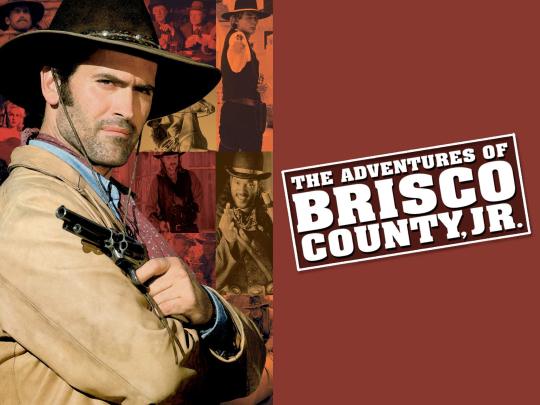
This Westember review is going to be diffrent from my others cause....Well this is a whole TV show ,that I have been watching all through the month . Brisco County Jr is a cult classic TV show from 1993-1994 ,that sadly lasted only one season of 27 episodes
Premise: After the death of his father Brisco County (R Lee Ermy) ,bounty hunter Brisco County Jr (Bruce Campbell) is appointed by Robber Barons to hunt down John Bly (Billy Drago ) and his henchmen,the men responsible for killing his father . Brisco discovers John Bly is after a mysterious object known as the orb which has vague powers .Along the way Brisco is joined by rival bounty hunter Lord Bowler (Julius Carry ) and lawyer Socrates Poole (Christian Clemenson ) ,as well as other colorful characters as he takes on new bad guys each week
So I like the show ,its a solid show that part of me is very sad it didnt last longer....But I'd be lying if I said I dont understand why it was cancelled ,cause this show is designed to be a cult favorite .The show is primarily a western ,the show is hodge podge of diffrent genres ,notably Sci Fi and comedy ....And I am just gonna say it,the sci fi elements are kind of weak,they dont go far enough with them . The main Sci Fi element is the Orb ,and it is infuriatingly vague what this thing is ,just that the bad guy wants it and it gives ya powers ,but not always .It is a total Mcguffin.....Thing is the writers knew this and this is written out before the finale,and constantly joke about the orb .In fact the sci fi stuff is pretty much phased out before the end
Where the show shines is the comedy .Now humor is subjective ,but for me the humor works . The show takes place in the 1890's but is intentionally anachronistic ,leading to some out there insanity : This can be minor jokes (My favorite being a young kid named Duncan who invents these things called Doughnuts ) to biker gangs,Elvis's ancestor and LAND PIRATES .ITs a very out there show and that is part of the appeal
The show is really inspired by old school film serials so its full of some pretty great action and exciting cliff hangers before commercial breaks
The characters are my favorite part of the show :
Brisco is played by legendery cult movie icon ,Bruce Campbell,in probably one of his best roles ,as a intelligent lawyer turned bounty hunter,focused on the "coming thing" as the world is changing and he feels something special is coming round the corner
My favorite character is Lord Bowler played by the late Julius Carry , a rival bounty hunter,who by the end of the show is Brisco's best friend and companion (Which came about as the writers noticed the real friendship between Campbell and Julius Carry ), he is both tough and hilarious ,but the moments I love are where he shows his softer side (My two favorite scenes in the show are both Bowler Moments ,one from the Orb Scholar and another from the finale High Treason )
Socrates ,played brillaintly by Christain Clemonson,is the exposition man and a source of comic relief,as he is a high strung contrast to our rough heroes
Recurring characters include Kelley Rutherford as Briscos primary love interest Dixie Cousins(Who was supposed to be a one off character but Rutherfords chemistry with Campbell was so on point they kept bringing her back ) , the legendary John Astin as the wacky inventor Professor Wickwire ,John Pyper Ferguson as incompetent criminal Pete Hutter who is the shows funniest character (And Pyper-Ferguson's performance was so good they brought him back after KILLING him in the pilot and making him surviving improbable circumstances a running gag ) and Jeff Phillips as hot shot Whip Morgan (Who of the main cast is my least favorite ,but I feel he had potential )
The main villain of the show is John Bly played by the late Billy Drago ,a gang leader who acts like a cult leader.....Who is one of the best villains I have seen on TV .This guy is CREEPY and any time he shows up its an event (Lot of my favorite episodes have him )
Show is chock full of great guest stars (Favorites being Denise Crosby as a sheriff ,David Warner as an assassin , Tony Jay as a judge,Xander Berkley as a gambler,and Andrew Divoff as a pirate ) ,most of them character actors (Robert Picardoas a henchman ,Jason Marsden as a kidnapped kid ,and John P Ryan as an old friend of Brisco's father ) .....However there are two oddball ones:Football player Terry Bradshaw as a villainous military man in the finale and Timothy Leary ,a psychologist known for his advocacy of psychedelics as a stage coach passenger .They both do good performances but its very odd to see them in this show
OVerall I personally love this show,it is a fun western romp ,but it might have been too out there for audiences at the time . If you want a enjoyable western adventure ,with great characters I highly reccomend it
@ariel-seagull-wings @metropolitan-mutant-of-ark @theancientvaleofsoulmaking @amalthea9 @lord-antihero @princesssarisa @marquisedemasque @filmcityworld1
8 notes
·
View notes
Video
youtube
ironwoods tragic fall from grace
comments on youtube
When a hero becomes the villain, all hell breaks loose. Especially when the fallen hero is general of the Atlesian army.
The only thing that I noticed was that Ironwood has constantly grown a Beard as time passes. He's slowly decending towards from Hero to Villain as a "Fallen Hero" Catagory. James Ironwood WAS a good man, utterly dedicated to protecting his people. It was with the best of intentions that he charged down the path he’s taken... but you know what they say about good intentions.
I didn’t think his semblance was much of a factor into his decisions before Vol 7 but now as he’s become more unhinged every chapter, it’s becoming even more strikingly obvious that he’s become a slave to it. The fact that his semblance increases his resolve to go through with bargaining with Watts, willing to blow up Mantle just to save Atlas.
He's like the antithesis of Leonardo Lionheart
You know, this is a really good counter for all those people saying Ironwood is suffering character assassination. He's not. He's giving in to fear and letting his worst aspects take command.
I’m personally asking again why would the writers talk about something like Ironwood’s semblance outside the show when for the most part the majority of people only watches the show, that’s like how the Russo brothers (the writers and directors of Avengers Infinity War and Endgame) choose to answer the hows and why on Twitter when the majority of people are only watching the movies I personally love those movies but it also would’ve been nice to see those things get explained or talked about in the movies just like how it would be nice to at least mention Ironwood’s semblance in the show
Honestly, I love what they're doing with Ironwood. His slow, inexorable descent into extremism is a wonderful exploration of how an idealistic person who believes themself to be the hero can tumble into villainy without trusting others to keep them grounded. It's the very real problem of the philosophy of "The ends justify these particular means;" if you can justify one morally gray decision to achieve a good goal, it gets easier to justify the next, darker gray decision. Without someone outside to call you on your bullshit, you're eventually justifying genocide because it will be for the "greater good."
Ironwood is literally the Darth Vader of RWBY. He starts of as a respectable character, commanding his own army for the good of all. But he gives in to all of his fears, looses a limb or 2, and slowly turns misguidedly evil, willing to kill ANYONE who stands in his way.
I've said before that Team Rwby is a foil to the Headmasters. Ruby keeping secrets like Oz, Leo/Blake, the faunus who ran away when things got hard, and Ironwood's parallel is Yang.
Not just obvious stuff, like both having metal arms. But both of their semblances are double edged sword. Yang get stronger taking damage, but if she leans on it too much, an enemy that takes one hit just destroys her since she can't fight back. Volume 4 has her training with Taiyang to correct this flaw in her thinking, leading to her overcoming Adam in her rematch in V6.
Ironwood's semblance can be incredibly powerful. Just off the top of my head, he basically no sells the Apathy, which is an incredibly dangerous Grimm in a group with other, stronger Grimm. But it has downsides, and we're seeing it. The correct way to use it is after you've made a choice, to focus on the task at hand. But making large choices while under the semblance is not smart. He's too focused on one action to see others that have opened. Atlas has to be raised, because that's what he's already decided to do. The idea that they've made contact with the world and reinforcements might be coming never entered his mind. Similarly, he's so focused on forcing Penny to heel that he's not seeing he has a chance to have her come willingly by aiding in Mantle's rescue.
He's so focused on winning this one battle (Having Penny raise the city to escape Salem immediately) that's he's making choices to doom the larger war (defending the kingdom's people, defeating Salem, reuniting the world).
He clearly knows that it isn't smart to rely on it this way, since he's shown the ability to take criticism and adjust his thinking in Volume 7 (Nora would've been Slate'd if he couldn't). But the combination of Yang/Blake going behind his back to tell Robyn, Ruby/Oscar not telling him the truth, Qrow seemingly killing Clover, and, right when he thought that he'd saved everyone, the idea that every single thing he's done might've been exactly what Salem wanted has fairly understandably shaken his faith in the others around him. He can't rely on them to rein him in, he has to do that... which is exactly the problem with his semblance. If the only person who can stop you is yourself, and you're convinced you're always right, you've doomed yourself.
I'm assuming that he could probably be talked down by Glynda or potentially Oz or Qrow (fat chance of that one) if they can break his aura, but as it stands, unless someone beats him down, he's not going to be able to stop himself.
With Ironwood I am reminded of a very profound quote from CS Lewis, that I feel summarizes him very well: "Of all tyrannies, a tyranny sincerely exercised for the good of its victims may be the most oppressive. It would be better to live under robber barons than under omnipotent moral busybodies. The robber baron’s cruelty may sometimes sleep, his cupidity may at some point be satiated; but those who torment us for our own good will torment us without end for they do so with the approval of their own conscience. They may be more likely to go to Heaven yet at the same time likelier to make a Hell of earth. This very kindness stings with intolerable insult. To be “cured” against one’s will and cured of states which we may not regard as disease is to be put on a level of those who have not yet reached the age of reason or those who never will; to be classed with infants, imbeciles, and domestic animals."Show less
Dude Ironwood didn't have a problem with trusting people and didn't have a mentality of not being able to trust people. He trusted to much and trusted people who both betrayed his trust (Yang/Blake) and didn't reciprocate the trust he gave them (Ruby and the rest of the main cast). Honestly, he would have been perfectly right to have immediately put the relic of knowledge into the vault at the start of v7 and then send the students on their way and have nothing more to do with them.
Ironwood saw Atlas and his fleet as a way to inspire hope. It's ironic that his plan was one of lifting them up so high that nobody would ever be able to see them anymore.
My only criticism with Ironwood is that I really really wish his semblance was brought up in the show. Are they ever going to bring it up? I absolutely LOVE how he has been written and watching his tragic descent into becoming a villain but having his semblance mentioned in show would be great. Is someone going to have to break his aura or something before he or someone else mentions it?
In a way he is. His semblance is a double edge sword, as someone in Ironwood's position is all about making calls. Ironwood was able to climb through the ranks because his semblance allowed him to follow through with his actions to save people (I also still wonder what happend to halve of his body as he already had a metal leg and arm in volume 2, we can asume the paladin project, but some confirmation would be wonderfull). Now he's following through on his words agains Salem, that Ironwood isn't going to let Salem take the relic of creation. Ironwood essentially only has this thought he is focused on and is disregarding everything else. Right now Salem is piecing herself together again and Penny is going to the vault, if Ironwood semblance of Mettle wasn't interfering he would be able to see the bigger picture of let Penny open the vault, take out the staff of cration and chuck whatever goop Salem is right now with the bit of land she is piecing herself on right now and throw that into the vault and close it for good by blocking off the entrance with concrete. Voila. Ironwood doesn't notice at this point his actions as he even thought councilman Slate, who was asking Ironwood to explain his action got put down by Ironwood himself. Same for Marrow later on, but Winter was able to step in. Ironwood needs to be saved from this mindset and I think the team up of Qrow and Robyn (also who ever was on the elevator, I think it was Winter and Marrow as Winter was taking him away to be put in jail) could save Ironwood to the point of breaking his aura that way the influence of Mettle will loosen.
Gonna be honest, I dislike the whole concept of his semblance and it being what's driving him to this is just dumb to me. I loved him as a character and this entire volume feels like every bit that made him an interesting character has been ripped away. It's likely just me, but prior to Oscar using the built-up magic to beat Salem it felt like they had painted themselves into a corner. Either Ironwood was proven right that some sacrifices had to be made for the good of the people, or Salem was going to be beaten and even if she can come back, she no longer feels like a huge threat to me. I loved Ironwood in volume seven and many of team RWBY's choices have infuriated me for how contrived and stupid they manage to be while also contradicting themselves so easily. To be frank, I feel like his semblance was just an excuse for this utterly stupid character assassination they're trying to justify.Show less
I kind of feel like the writers 'forced' Ironwood to become a villain. Some of his decisions just don't make sense.
6 notes
·
View notes
Text
The Weekend Warrior 10/16/20: SYNCHRONIC, FRENCH EXIT, TRIAL OF THE CHICAGO 7, LOVE AND MONSTERS, HONEST THIEF, THE KID DETECTIVE and More!
After the last couple weeks, I really need a break, which is why I’m writing most of this in transit to Columbus, Ohio to see my mother, sister and all (or some) of the friends that I made during my sabbatical to the city seven years ago for cancer treatment.
On, and look... Variety wrote about the movie theater chains and NATO lobbying Governor Cuomo to reopen movie theaters, showing that there’s been no proof of any cases leading back to movie theaters. (And more from The Hollywood Reporter…) New York leads and the world follows? More like ED leads and the world follows. Been saying this shit for months now and putting up with all sorts of needless abuse for it.
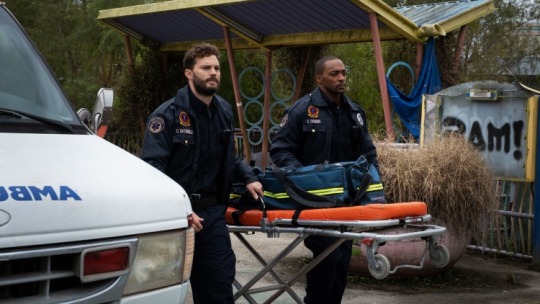
This week’s “Featured Flick” is actually a movie coming to theaters on October 23, but since I’m not sure I’m writing a column next week, I’m gonna review it this week! Cool? The movie is SYNCHRONIC (Well Go USA), and it’s the follow-up to Aaron Moorehead and Justin Benson’s amazing sci-fi film The Endless from a few years back. This ome stars Anthony Mackie and Jamie Dornan as parademics in New Orleans who have been coming across a series of bodies that have died in gruesome ways, all connected by a designer drug they were all taking.
I’ll just say right from the start that I loved almost everything about this movie from the amazing performances by Mackie and Dornan to the entire look and tone of the movie, which shows the duo taking huge steps forward as filmmakers, particularly Benson as a screenwriter. Unfortunately, I’m not sure what I can say about the movie and its plot without spoiling other’s enjoyment. I will say that it involves a designer drug and time travel and Mackie’s character has something odd about his brain that makes him better suited to figure out what is happening to the victims than others might be. Also, Dornan’s character Dennis has family issues, particularly with his daughter Brianna (Ally Ioannides), who disappears mysteriously, but it’s so nice seeing Katie Aselton as Dennis’ wife, as well as in another movie out this week.
I’ll also say that people who watch this movie will inevitably make comparisons to the work of Alex Garland and maybe even the more-versed ones might see a little of David Cronenberg’s Videodrome in the film’s trippy nature. The thing is that the movie is super-smart, and it’s obvious that Moorehead and Benson must have done a lot of research to make every aspect of it feel authentic. It’s just amazing what this duo can do with a small fraction of the money that Christopher Nolan had to make Tenet, and yet, they can create a complex and unique premise that’s actually easy to understand. Things like the camerawork, the music and sound design all add to the amazing tone and the mood that the duo have created.
I also think it’s Mackie’s best role and performance in many years, maybe even going back to The Hurt Locker, so as a long-time fan, I’m glad he connected with Moorehead/Benson to show that he’s more than capable of leading a movie like this.
Again, Synchronic will be in movie theaters and drive-ins NEXT Friday, October 23, but I want to give you an advance heads up, because Synchronic is likely to be the most original sci-fi or genre film you see this year. If you can’t get to the drive-in and don’t feel comfortable going to a movie theater, then I’m sure it will be on digital soon enough, but you definitely shouldn’t miss it!
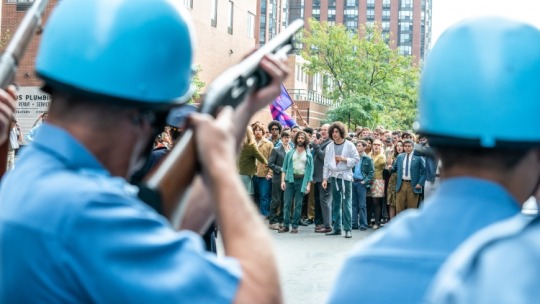
Next up is Aaron Sorkin’s THE TRIAL OF THE CHICAGO SEVEN, streaming on Netflix starting Friday and the movie I was most looking forward to seeing this week. I was such a huge fan of Brett Morgen’s Chicago 10 documentary, which opened Sundance in 2007, especially with how he recreated the court trials using animation and a talented roster of voice actors including Hank Azaria, Mark Ruffalo and Geoffrey Wright. Sorkin has just as an impressive list of actors for his version, including Mark Rylance, Eddie Redmayne, Sacha Baron Cohen, Frank Langella, Joseph Gordon-Levitt and many more.
If you don’t know about the protests outside the 1968 Democratic National Convention in Chicago – you see, back in those days, the Democrats were the bad guys… how times have changed!! Those protests led to a number of arrests but a few years later, the federal government charged a number of individuals with inciting the riot. The accused include Black Panther leader Bobby Seale, played by Yahya Abdul-Mateen II from Aquaman and Watchmen, Abbie Hoffman (Cohen), FBI agent Tom Hayden (Eddie Redmayne), Jerry Rubin (Jeremy Strong), David Dellinger (John Carroll Lynch) and two more. The six white guys are defended by Mark Rylance’s William Kunstler, who faces the tough Judge Hoffman (Langella) who is not putting up with any guff from these young revolutionaries.
All of the characters are quickly introduced with a quick-cut opening montage with actual newsreel footage, but then we’re quickly moved to a meeting to the Attorney General (Keaton) with the trial’s prosecutor (Gordon-Levitt). From there, we’re right into the trial about 16 minutes into the movie, although Sorkin frequently cuts back to the actual day of the Chicago protest to recreate what happened as testimony is given. Probably the part that will have the most impact and resonance is the way Seale was mistreated compared to the others, getting so riled up at the judge that the judge orders him chained and gagged. The trial would end up taking place for almost 7 months even though the results were eventually overturned.
This really is perfect material for Sorkin, and maybe if I hadn’t seen Chicago 10 first, I would have been a lot more fascinated by the trial sequences, though Morgen did an equally great job working from the transcripts. Basically, what happened happened. Where Sorkin’s screenplay and film excels is showing what’s going on outside the courtroom, whether it’s the recreations or just conversations taking place between the plaintiffs. As might be expected from Sorkin, the screenplay is great with lots of fast talking, making for a movie that moves at a kinetic pace for its two hours.
If I had to pick a few of the best performances, I’d probably focus on Cohen’s Abbie Hoffman, which is more than just an accent, he and Strong’s Rubin bantering back and forth like a seasoned Vaudeville act; Rylance’s Kunstler is spot-on, and Langella is just great as the crusty judge, the film’s only true antagonist. I also appreciated John Carroll Lynch and in fact, all the performances, although I felt that with so many characters, Sorkin wasn’t able to give Bobby Seale the time his story truly needed. Still, I would be shocked if this isn’t considered a SAG Ensemble frontrunner.
Ultimately, The Trial of the Chicago 7 is a fine recreation of a certain moment in history that still feels relevant and timely fifty years later, even if it’s so heavy at times you either need to focus or, like me, watch it on Netflix in two sittings. I still liked Steve McQueen’s movie Mangrove that takes place in a similar era and also culminates in a trial just a little bit better.
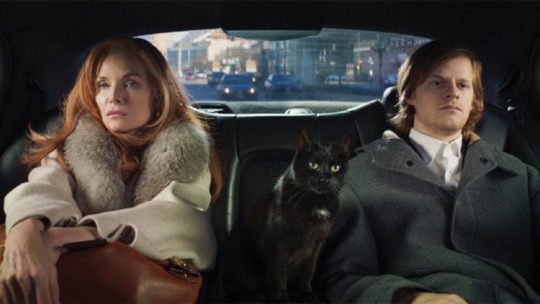
Before we get to the rest of this week’s new movies, I have one last review from the New York Film Festival, and it’s the closing night film, FRENCH EXIT, from director Azazel Jacobs and writer Patrick Dewitt, who has adapted his own book. The film stars Michelle Pfeiffer as Frances Price, a Manhattan widow from wealth who discovers she has no more money, just as her son Malcolm (Lucas Hedges with longer hair than usual) has decided to marry his girlfriend Susan (Imogen Poots) though he hasn’t told his mother that yet. With no other options, Francis takes her son on a ship to live in Paris for a while at the home of one Mme. Renard (Valarie Mahaffey), an elderly woman who is a genuine fan of Francis and welcomes them as her guests.
This is one of those ensemble character dramedies that I wouldn’t even be able to begin to tell you why you should see it unless you miss seeing Pfeiffer in a semi-decent performance, but one that doesn’t do much as the film itself is so boring and insufferably pretentious most of the time I’m not sure I can even recommend it for that.
Jacobs and Dewitt previous made the movie Teri maybe ten years ago, and I was never really a fan, so I’m not sure why I thought that Dewitt adapting his own book would bear better results. Once Frances and Malcolm get to Paris, there’s just an influx of odd characters who show up, some who have more impact than others. I liked seeing Danielle Macdonald as a psychic medium the duo meet on the ship across the Atlantic who Malcolm bonks. She’s brought back when Frances wants her to conduct a séance to communicate with her late husband who she thinks is now inhabiting an omni-present cat. Like everything else, the relationship between Malcolm and Susan and how that’s affected by her meeting a new guy just never goes anywhere.
For the most part, the whole thing is just dull and uninteresting, and so pretentious it never really leads to anything even remotely memorable. I have no idea why the New York Film Festival would decide to close with this one. (Although the 58th NYFF is over, some of the movies will hit its Virtual Cinema soon, so keep an eye out! For instance, this Friday, FilmLinc begins a Pietro Marcello retrospective as well as showing his latest film Martin Eden in FilmLInc’s Virtual Cinema.)
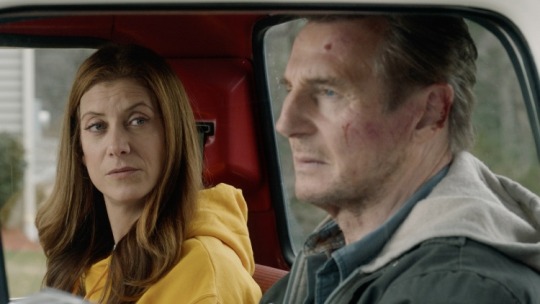
Liam Neeson stars in Mark Williams’ HONEST THIEF (Open Road), a crime-thriller in which he plays Tom Carter, the uncaught robber behind 12 bank robberies who decides to settle down with Kate (Grey’s Anatomy) Walsh’s Annie Wilkins, who he meets while renting a storage space to hide all the money he’s stolen. After a year of things getting serious with Annie, Tom decides to retire so he calls the FBI and says he’s ready to give back the 9 million, but two crooked FBI agents (one played by Jai Courtenay, the other by Anthony Ramos) decide they’re going to take the money instead. Their plan to steal the money Tom’s trying to return leads to a number of deaths, including putting Annie in the hospital. When that happens, Tom has had enough, and honestly, there’s no one better at getting revenge than Neeson. (Did we mention that Carter is ex-Marine? I mean, of course he is!)
Many will go into Honest Thief expecting the typical Neeson action revenge flick ala Taken or maybe one of his high-concept thrillers, but Honest Thief isn’t nearly that exciting. It starts out fairly slow and dry with no real crime or action elements, although Williams does throw them in from time to time. The whole thing is pretty dry, and it’s a good 54 minutes before we get to the revenge aspect of the story and that’s after a lot of bad decisions being made across the board. Anyone who is still wondering how Jai Courtney has a career won’t be changing that decision by his turn as the villain, and it’s a lot odd when the movie tries to make a sympathetic character out of his partner, played by Ramos.
Regardless, any elements that make Honest Thief unique from other Neeson action movies are quickly tossed aside for the same usual cliches, and the action scenes aren’t even that great. While Honest Thief may not be an awful or unwatchable movie, it’s probably not the action movie you might be expecting from Neeson – more like a bargain basement The Fugitive with one plot decision that almost kills the whole movie.
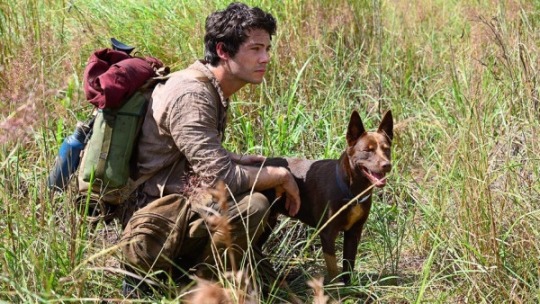
Delayed a number of times and now dumped to PVOD (with minimal theatrical) is Paramount’s LOVE AND MONSTERS, which is written by the prolific Bryan Duffield (The Babysitter, Spontaneous), directed by Michael Matthews and produced by Shawn Levy’s 21 Laps Entertainment. In the movie, Dylan O’Brien plays Joel Dawson, a young man surviving the apocalypse with a small community after the government’s plot to blast a couple asteroids heading to earth backfires. Instead, it creates giant, carnivorous monsters out of the earth’s animals who eliminate 95% of the earth’s human population. (We learn all of this through a Zombieland-like animated prequel getting us up to speed.) Before the earth fell into disarray, Joel was in love with Jessica Henwick’s Aimee, but they were separated by the fateful events. Seven years later, they’re reconnected via radio and Joel has sworn to travel the 85 miles across the creature-covered wasteland to reunite with her. Hence, the title “Love and Monsters.” Get it?
I actually didn’t hate this movie, although it’s not really a family film or one meant for young kids, because it’s PG-13 for a reason, including mild violence i.e. people being chomped by monsters, and some sexuality. Dylan O’Brien does a decent job carrying it, but it relies just as much on the other people he meets, particularly Michael Rooker’s Clyde and his young ward Minnow, played by Ariana Greenblatt, the latter who is such a scene-stealer that it’s disappointing they’re only in the movie for a small chunk. They’re probably the funniest part of the movie.
I like giant monsters and these ones are certainly … interesting. They seem to have been toned down a bit maybe to be more kid-friendly, more like the kid-friend Godzilla than the terror we’ve seen in recent incarnations. There are also a number of great action set-pieces, and some good post-Apocalyptic ideas we haven’t seen, especially when Duffield’s dark sense of humor is able to come out and keep things fun.
Still, Love and Monsters is not a kids’ movie, and there’s something about it that might make people wish the filmmaker just went full-on R, because going further towards PG would have made even the best parts quite painful to get through. As it is, Love and Monsters is a suitably fine boy and his dog adventure – oh, did I mention the dog? – that would make a perfectly fine streaming movie.
We’ll get back to some of the other theatrical releases in a bit, but I wanted to get to two movies that were pleasant surprises, maybe because I went into them with absolutely zero expectations.
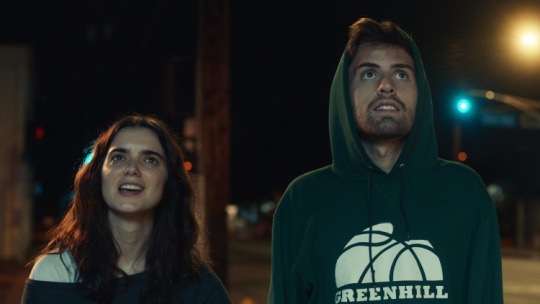
I wasn’t really sure what to think about Cooper Raiff’s SH#!%HOUSE (IFC Films) at first, maybe because it’s title is a little off-putting and not really particularly representative of what the movie is. Raiff himself plays Alex Malmquist, a fairly new arrival at his college but already missing home and his mother (Amy Landecker) and not really adjusting to the crazy college lifestyle as exemplified by his roommate Sam (Logan Miller). After a party at a frat called “Shithouse” (hence the title), Alex meets and connects with his dorm’s R.A. Maggie (Dylan Gelula) and the two spend the night bonding and hanging out.
Obviously, someone at IFC Films loves these platonic indie two-handers about people meeting and hanging out over the course of a night, because Shithouse is the second such movie after Olympic Dreams earlier in the year. They also must know that I’m a sucker for these kinds of semi-rom-coms, because just like with that other movie, I totally ate up everything Raiff was trying to do and say with his movie. The chemistry between the two leads is undeniable, and maybe it won’t be a surprise that Gelula also appeared in Raiff’s previous movie.
As with any relationship, things do come to an end, and this one crashes and burns in a very sad way for Alex the very next day. Maggie starts to pretend she doesn’t even know him, and she ignores his incessant texts saying how much he enjoyed their night together. Boy, I have been there back in my reckless and romantic days of youth.
At first, I wasn’t that into Raiff as an actor – remember what I’ve said about filmmakers casting themselves? – but Alex definitely grew on me. Gelula is absolutely amazing, and frankly, I can see someone “discovering” her in ten years and becoming a new Parker Posey, Kate Lynn Sheil or other similar indie ingenue.
The combination of the two is what makes Shithouse such a special experience, since their situations are quite relatable and Raiff does a great job with the characterization in his writing to make this quite enjoyable to see how things will resolve themselves.

I also wasn’t quite prepared for how much I’d enjoy Steve Byrne’s THE OPENING ACT (RLJEfilms), maybe because I was unfamiliar with Byrne, and as usual, I didn’t read the description of the movie before sitting down to watch it. If I did, I would have known that Byrne is a stand-up comic and presumably this movie is somewhat based on situations that have happened to him. It stars Jimmy O. Yang from Crazy Rich Asians (a great comic in his own right) as Willy Chu, a young comic who has always dreamed of making it in stand-up but instead, has been stuck trying to get slots at an open mic night, while holding down a day job working at an insurance company. One day, his friend (Ken Jeong) sets him up for an MC gig in Pennsylvania at the Improv where his idol Billy G (Cedric the Entertainer) will be performing, so Willy quits his job to pursue his dream.
Much of Byrne’s movie deals with Billy’s “adventure” in Pennsylvania with the club’s womanizing featured act (played by SNL’s Alex Moffatt) and trying to face the struggles of stand-up in hopes of getting to the next level. There have been better movies about the subject, like Mike Birbiglia’s Sleepwalk with You, but Byrne’s film is a nice addition, particularly because Yang plays such a likeable, benevolent character you want to see him do well even after he crashes and bombs on a Saturday night and is at risk of losing the Improv gig.
It’s obvious that Byrne pulled in a lot of favors from friends to get such a great cast of comics – even getting Whitney Cumming to make a cameo – but the likes of Bill Burr actually take on key roles, like Willy’s boss in that case. Moffatt is particularly hilarious expanding on some of his outrageous SNL characters to play a stand-up who actually does help Willy, even as he puts him in pretty awful situations. Cedric also gives another fantastic performance as Willy’s idol who gives him the cold shoulder at first but eventually comes around and offers him the mentoring that Willy needs.
The Opening Act isn’t anything particularly revelatory, but it is thoroughly entertaining, and a nice little indie that I hope people will discover for themselves, especially those who like (or perform) stand-up.
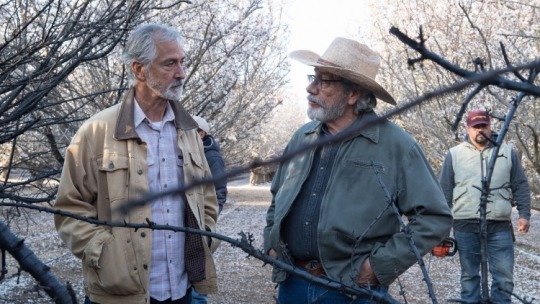
Edward James Olmos directs THE DEVIL HAS A NAME (Momentum Releasing) starring the great Oscar-nominated David Strathairn as almond farmer Fred Stern, who has been running his orchard for three decades with trusty second Santiago, played by Olmos himself. Things are going well until they notice that some of the trees are rotting. It turns out they’re being poisoned by the water that’s been sullied by crude oil run-off from the nearby Shore Oil rigs. Around the same time, an opportunist named Alex Gardner, played by Haley Joel Osment, offers Fred a very low-ball offer to buy the farm, though Fred suspects something is up, and sure enough, Shore Oil is responsible.
Another movie I didn’t know what to expect other than a few cursory elements is this movie “based on a true story” movie about the little farmer taking on “The Man.” In this case, Shore Oil is represented by Kate Bosworth’s Gigi Cutler, a tough exec. at the corporation who thinks their lawyers (one of them played by Katie Aselton!) can crush this local troublemaker. When Stern’s lawyer (Martin Sheen) sues the oil company for 2 billion, they need to start taking things seriously, bringing in a tough “fixer” played by Pablo Schreiber.
I’m not sure where to begin with this movie that certainly has noble intentions in telling this story but suffers from quite a few issues, mostly coming from the script. I was a little concerned once I knew the premise, because I was not a huge fan of Todd Haynes’ Dark Water from last year, although I did enjoy the Krasinski-Damon-Van Sant ecological venture, Promised Land. This one falls somewhere in between, and probably its biggest issue is that it tries to create some humor out of the erratic behavior of the characters played by Bosworth and Schreiber; both performances are so off-the-rails at times it regularly takes you out of Fred’s story. (Osment is also pretty crazy but at least he fits better into his role.) Strathairn is great and well-cast, and Olmos is equally good, and I imagine that it’s partially because many of their scenes are together, allowing Olmos to direct with his acting. Aselton and Sheen are also decent, especially in the courtroom scenes.
Oh, and did I mention that Alfred Molina plays the Big Boss, who is interrogating Cutler as a needless framing device? Yeah, there’s a lot of characters, and when you hold this up against something like The Trial of Chicago 7, it’s just obvious that the film has too many elements for any filmmaker to be able to juggle at once.
Because of this, The Devil Has A Name is an erratic real-life dramedy that’s too all over the place in terms of tone, it ends up shooting itself in the foot by trying (and failing) to be funny despite the serious subject matter.
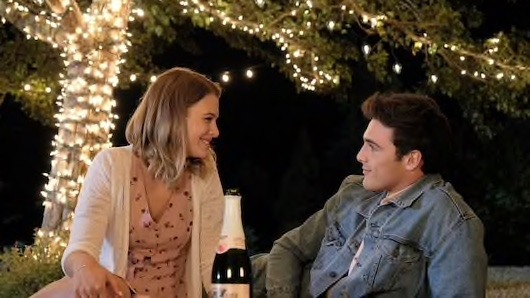
Next up is 2 HEARTS (Silver Lion Films/ Freestyle Releasing), another movie based on a true story from the Hool Brothers, who I really wasn’t very familiar with. I assumed this was going to be a faith-based movie, and maybe in some ways it is, but not really. It essentially tells two stories set in different time periods that you assume will somehow be connected. Ooh, boy.
First, there’s Jacob Elordi of Euphoria and The Kissing Booth – neither of which I’ve seen, mind you – who plays Chris Gregory, a college kid who connects in a meet-cute way with Tiera Skovbye’s Sam. Before we get too far into their story, we cut back to what looks like Cuba in the ‘50s and 60s, and meet Jorge Bolivar (Adan Canto), the son of an alcohol magnate, a soccer player who suffers a serious lung issue that puts him in the hospital. Years later, Jorge is travelling to Miami when he meets Radha Mitchell’s Leslie working as a flight attendant.
Both guys are pretty suave smooth-talking pick-up artists, and the movie spends almost an hour cutting between two very corny and cheesy romance stories that really don’t offer much in terms of story. Instead, it keeps following Chris and Sam’s life as they have kids, taking forever to get to the connection between the stories. I was getting pretty bored of the movie, but I felt like I had to stick it out to see what happens.
When you call a movie “2 Hearts,” you kind of expect it to be about a heart transplant of some kind, right? But no, it’s actually about a dual lung transplant that Jorge receives. Want to take a wild guess who the donor is? I certainly don’t want to spoil what happens, but for a movie that spends a good hour setting up the relationships between the two men and their pretty blondes with ups and downs that makes it seem like a Nicholas Sparks movie, it really throws a spanner into the fairy tale with all the melodrama that’s to come. It’s such a whiplash in terms of tone it pretty much destroys any chance of one enjoying the movie for what it is. It also loses a lot without Elordi, since the actors who play his family aren’t very good at all.
I had to actually look up the story to see how much if it was true, only to learn that Jorge was based on Jorge Bacardi who actually received a double lung transplant from one Christopher Gregory, inspiring him to create the Gabriel House of Care. The problem is that the time periods get so messed up by setting one story decades in the past. Using the same actors to play the people over that time with pretty shabby make-up just makes things that much more confusing. The big problem is that it spends so much time avoiding the actual plot and point of making the movie that by the time it gets to it, you just don’t care about the characters anymore.
The whole thing is very by the books and predictable, but ultimately, it’s hard to believe any of it, despite it being based on a true story. If you go into this movie expecting love and romance and all that kind of mushy stuff from the title, you’re likely to be disappointed when the movie finally gets to its point. (In other words, it could have used some giant monsters.)
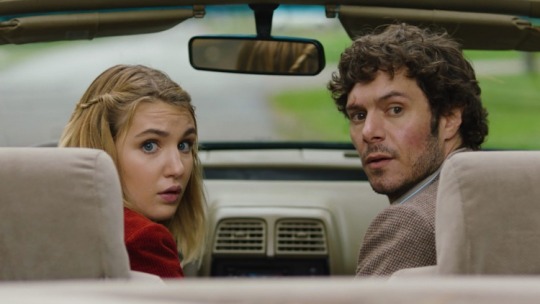
Here’s another movie that I didn’t really know what to expect going in and that probably should have helped me enjoy it more… if it was anything resembling a good movie. Picked up at the Toronto Film Festival where it premiered last month, Evan Morgan’s THE KID DETECTIVE (Sony) stars Adam Brody as Abe Appelbaum, the “kid detective” of the titles, who as a child was one of those super-smart kids who have the deductive powers to help the people in his community, but as a 32-year-old, he just isn’t taken as seriously any more. When a high school girl named Caroline (Sophie Nélisse) comes to Abe to find out who murdered her boyfriend, Abe finally realizes that he has his first grown-up case, though he’s still obsessed with the disappearance of the mayor’s daughter (and his kid receptionist) Gracie many years earlier.
I’m sure there’s gonna be people out there who watch and appreciate The Kid Detective for what it is, a wry and slightly clever noir pastiche pseudo-comedy, but anyone who has seen Rian Johnson’s first film Brick or the underrated Mystery Team (starring Donald Glover very early in his career) might feel that this doesn’t live up to either. Besides the fact that Brody really hasn’t developed much personality as an actor, the film rolls along with a fairly flat, deadpan tone that just never gets remotely exciting. The humor is subdued and yet it feels like everyone is constantly trying too hard, particularly Morgan, while at the same time not really taking any chances. This is a movie that could have been edgier but instead, it milks its flimsy high-concept premise as long as possible before giving up.
Like Love and Monsters, Sony is releasing The Kid Detective into theaters on Friday, and hopefully parents will check that rating before assuming it’s a kid flick. Although there isn’t so much bad language or anything that wouldn’t warrant a PG… other than the fact that it’s not particularly funny or even entertaining and kids will be super-bored.
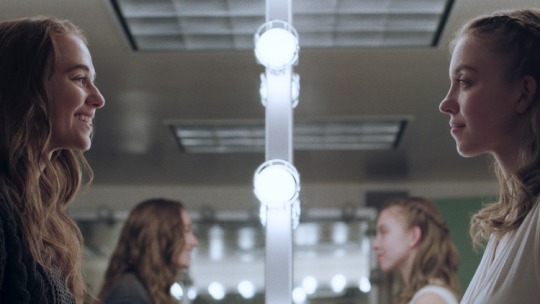
I can’t believe there’s still more! Amazon’s “Welcome to the Blumhouse” anthology series continues this week with two more movies in the series of eight, which you can now watch on Prime Video:
Easily my favorite of the four movies I’ve seen is Zu Quirke’s NOCTURNE (Amazon), which follows a pair of twins, Julie (Sidney Sweeney) and Vivian (Madison Iseman), who are both competitive concert pianists at the Lindberg Academy, although Vivian is clearly the better, as she’s heading off to Julliard while Julian is taking a gap year.
Before we meet them, we see a young violist jumping off the balcony to her death for some reason, and we learn that she was the finalist to play a concerto, so now that slot is open and both Julie and her sister desperately want it.
Nocturne is certainly more like the horror movies we expect from Blumhouse, which is both good and bad. The good is that it is indeed quite scary as Quirke’s team uses really eerie lighting effects and other things to create suspense. But there’s also an artiness to what Quirke does that elevates Nocturne above the normal high-concept horror-thriller.
Quirke, who also wrote the film, delivers all the characterization you expect from a good horror film so that you really care about the characters, and she’s put together such a fine cast, particularly Sweeney who has to run a gamut of emotions as Julie. I also like Rodney To as Julie’s tough instructor Wilkins
Again, I won’t say too much more about the actual plot, although if you can imagine a Faustian bargain and how that plays out for those around Julie, you can probably understand why a super-fan of The Omen might dig what Quirke did in this environment.
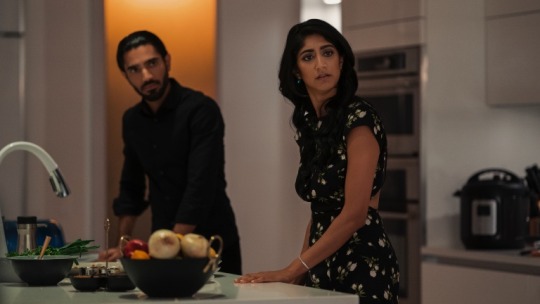
The fourth movie in the “Welcome to the Blumouse” series is EVIL EYE (Amazon), from Indo-American filmmakers Elan and Rajeev Dassani, a relatively innocuous thriller based around the relationship between Pallavi (Sunita Mani from last week’s Save Yourselves! and GLOW) and her mother Usha, played by Sarita Choudhury. Pallavi is in her late 20s and single and her mother keeps wanting to get her set-up with a nice man, as a good Indian mother is wont to do. When Pallavi meets Sandeep (Omar Maskati), things are going well since he has money and her mother thinks her daughter has hit the jackpot, until she realizes that Sandeep has a dark secret.
Here’s another thriller where it’s really tough to talk about the plot, because obviously the filmmakers want the story to unfold in the specific way it was written. Apparently, this one was once an Audible story, and the first thing I noticed was how amazing Sunita Mani looks from her fairly glammed down roles in other things. I think she’s just wearing make-up and has her styled different but I’m not sure I would have known it was the same actor in Save Yourselves! Because I had to do a double take.
The problem with Evil Eye, and it’s been a problem with some of the other “Welcome to the Blumhouse” movies, is that it isn’t necessarily what I’d consider horror. It really plays a lot more like a romantic drama, other than the fact that Pallavi’s mother has visions and believes in astrology enough to send her daughter trinkets to protect her from the “evil eye.” In fact, the movie just gets weirder and weirder, as it starts introducing supernatural elements, and without giving the big plot twist away, it does expect one to believe in reincarnation.
I wish I could have liked this more, but it really seems like it would be better suited for a show like “The Outer Limits” or “The Twilight Zone,” since the premise is stretched so think for about 30 minutes longer than necessary. I think the filmmakers did perfectly fine with what they had to work with – the two main actresses are just fab – but I think I’d need to see some of their other work to see if the issues I had were just cause the story isn’t that interesting or by their limitations in making it.
(And I promise that I do have a feature on all the filmmakers from the first four “Welcome to the Blumhouse” series coming over at Below the Line, but it’s been a pretty tough piece to write.)
I reviewed Alex Gibney’s new doc Totally Under Control (Neon/Participant), co-directed with Ophelia Harutyunyan and Suzanne Hillinger, in last week’s column but it’s now available to watch On Demand and then it will be on Hulu starting next Tuesday, October 20. Obviously, everyone wanted to get this out there and make sure people see it before they get too in-deep with the election.
I also reviewed David Byrne’s American Utopia (HBO), directed by Spike Lee, a few weeks back, but it will be on HBO and presumably HBO Max on Sunday night. Not as big an event as Disney+’s Hamilton but still worth watching, especially if you’re a fan of Byrne or his band the Talking Heads, because it actually acts as a nice counterpoint bookend to the late Jonathan Demme’s fantastic Stop Making Sense, one of the best concert documentaries ever made, or at least top 5. I’m bummed I missed Byrne’s show on Broadway, and it doesn’t sound like Broadway will be coming back anytime soon so I guess this HBO documentation is the best any of us can wish for.
Of the movies I didn’t have time to watch this week, the two that I’m hoping to still get to are two docs: Inna Blockhina’s SHE IS THE OCEAN (Blue Fox Entertainment) and Rick Korn’s HARRY CHAPIN: WHEN IN DOUBT, DO SOMETHING (Greenwich). She Is the Ocean explores the lives of nine women who all have a passion for the ocean. The Harry Chapin doc may be more self-explanatory, and I wish I was a bigger fan of Chapin, the famed singer/songwriter/activist, because maybe I would have watched this movie earlier. (But seriously, look at how many movies came out this week, when I was hoping it would be “slower”!) Also, I’m a little bit interested in the K-Pop doc #BlackPinkLightUpTheSky that will air on Netflix, just because, I dunno, I like adorable, young Asian women, so sue me?
Premiering on Disney+ this Friday is Justin Baldoni’s CLOUDS, starring Fin Argus as musician Zach Sobiech, who has only months to live when his cancer starts spreading, but he follows his dream to make an album and becomes a viral music phenomenon. I’m not sure if this is a true story but it certainly sounds a lot like a faith-based film called I Still Believe that hit theaters just before they all shut down due to the pandemic. Coincidence? I think not.
Also this week, the 32nd ANNUAL NEWFEST LGBTQ FILM FESTIVAL begins on Friday, running through October 27 with opening night being the well-regarded Ammonite, starring Kate Winslet and Saoirse Ronan, but it will be done as a drive-in, so I’m out. Over in Los Angeles, the AFI FEST starts on Thursday and runs through October 22, and that’s also showing a lot of cool festival/awards films that I haven’t had a chance to watch yet like The Father, I’m Your Woman and more. I missed my chance to get press accreditation, so yeah, I guess I’ll be waiting on that.
And then we get to all the movies that I didn’t have time to see or didn’t receive a screener, so here we go. This week’s unfortunate dumping ground:
Lupin III: The First (GKIDS) (This anime film is being released as a Fathom event on Oct. 18 – dubbed, and Oct. 21 – subtitled)
Belly of the Beast (I’ve actually heard good things about Erika Cohn’s doc about illegal sterilizations being conducted in a woman’s prison.)
Don’t Look Back (Gravitas Ventures)
Rom Boys: 40 Years of Rad (101 Films)
The Antidote (Cinetic/Brand New Story)
Monochrome: The Chromism (Tempest)
J.R “Bob” Dobbs and the Church of the Subgenius (Uncork’d)
Monster Force Zero (WildEye Releasing)
Ghabe (GVN Releasing)
The Accidental President (Intervention)
In Case of Emergency (Kino Lorber)
I’m not sure how much of a column I’m gonna write next week since I won’t have nearly as much time to watch movies or write about them in the coming week, while I’m in Colmbus. There are a couple high profile movies I hope to get to, so we’ll see what happens.
By the way, if you read this week’s column and have bothered to read this far down, feel free to drop me some thoughts at Edward dot Douglas at Gmail dot Com or drop me a note or tweet on Twitter. I love hearing from readers … honest!
#TheWeekendWarrior#Movies#Reviews#VOD#Streaming#Synchronic#TrialOfTheChicago7#FrenchExit#LoveANdMonsters TheKidDetective#Nocturne#2Hearts#Shithout#THeDevilHasAName#TheOpeningAct
1 note
·
View note
Text

I really do wish fan media would stop implying that a villain can’t have a sympathetic backstory and ALSO be evil. It’s this whole disdain of “woobifying” culture all over again.
If I had a penny for every time someone’s meta cited the Simm Master’s backstory as essentially the “whining” of an “emo,” i’d be richer than Jeff Bezos and the other 21st century robber barons. I utterly fail to understand how having what is comparable to constant autistic/adhd overstimulation, or a chronic illness, is the same as the whining of a pathetic fuckboy. But okay Karen.
Please understand that a villain can be sympathetic, but still be indicted for what they DO with their pain, to others. In feeling pity for them, you are not condoning nor are you romanticizing their actions. And I grow weary of feeling like I have to pass some sort of ethical test by stating this fact over and over.
As an artist, intersectional feminist, and professor of media studies, I am well aware that nothing holds a greater impact over society than the consumption of media, even, perhaps especially, fiction. Fiction is the mirror we hold up to ourselves, and the accuracy of its reflective surface is in our willingness to be delving and inclusive. Representation is everything, and it can make or break entire peoples.
Simultaneously, however, it’s in the realm of fiction that we can safely explore our triumphs and heartaches, identify with and live vicariously through characters on the entire range of morality: specifically toward that goal of representation.
This is not about justifying the actions of a fictional villain, or even about justifying redemption arcs. It’s about having the courtesy to remember there are real people at the keyboard and mouse pad sharing their love of these characters that it is so popular to hate. Please do your best, if you are reading this, to understand that sometimes a fictional character saves a real life by serving as that kind of tool for the exorcism of real emotional ghosts. When you belittle the trials of the character, with whom real people identify, even a villain, what you are doing is also invalidating a real person’s real struggles.
I am so tired of saying this over and over again, and feeling unwelcome in my own community.
24 notes
·
View notes
Text
Colonialism
You back into things sometimes.
One of my many guilty pleasures is old school pulp, which I first encountered with the Doc Savage reprints in the 1960s, then old anthologies, then back issues at conventions, and now thanks to the Internet, an almost limitless supply.
And to be utterly frankly, a lot of the appeal lays in the campiness of the covers and interior art -- brass plated damsels fighting alien monsters, bare chested heroes combatting insidious hordes, etc., etc., and of course, etc.
Once past age 12, I never took these covers or the covers of modern pulps such as James Bond, Mike Hammer, or Modesty Blaise seriously; they were just good, campy fun.
While my main focus remained on the sci-fi pulps, I also kept an eye on crime and mystery pulps, war stories, and what are sometimes called “sweaties”, i.e., men’s adventure magazines.
Despite the differences in the titles and genres, certain themes seemed to pop up again and again.
Scantily clad ladies, typically in some form of distress, though on occasion dishing out as good if not better than they got.
Well, the pulps that drew my attention were the pups made for a primarily male audience (though even in the 1930s and 40s there were large numbers of female readers and writers in the sci-fi genre). Small wonder I was drawn to certain types of eye candy; I had been culturally programmed that way.
That’s a topic well worthy of a post or two on its own, so I’m putting gender issues / the patriarchy / the male gaze aside for the moment.
What I’m more interested in focusing on is the second most popular characters to appear on the covers (and in the stories as well).
The Other.
The Other comes in all shapes / sizes / ethnicities. Tall and short, scrawny and beefy, light or dark, you name it, they’ve got a flavor for you.
“Injuns” and aliens, Mongols and mafiosi, Africans and anarchists.
Whoever they were ”they ain’t us!”
Certain types of stories lend themselves easily to depicting the villainous Other.
Westerns, where irate natives can always be counted on to launch an attack.
War stories, where the hero (with or without an army to help him) battles countless numbers of enemies en masse.
Adventure stories, where the hero intrudes in some other culture and shows them the error of their ways.
Detective stories, where the Other might be a single sinister mastermind but still represents an existentialist threat.
And my beloved sci-fi stories?
Why, we fans told ourselves our stories were better than that! We didn’t wallow in old world bigotry, demonizing blacks and browns and other non-whites because of their skins.
Oh, no: We demonized green skinned aliens.
Now I know some of you are sputtering “But-but-but you wrote for GI Joe!”
Boy howdy, are you correct.
And boy howdy, did we ever exploit the Other with that show.
I never got a chance to do it, but I pitched -- and had Hasbro accept -- a story that would have been about the way I envisioned Cobra to have formed and been organized, and would focus on what motivated them.
They were pretty simplistic greedheads in the original series, but I felt the rank and file needed to be fighting for a purpose, something higher to spire to that mere dominance and wealth.
I never got to do “The Most Dangerous Man In The World” but I was trying to break out of the mold.
For the most part, our stories fit right into the old trope of The Other.
Ours were mostly about the evil Other trying to do something nefarious against our innocent guys, but there’s an obverse narrative other stories follow, in which our guys go inflict themselves on The Other until our guys either come away with a treasure (rightfully belonging to The Other but, hey, they really don’t deserve it so we’re entitled to take it from them), or hammer The Other into submission so they will become good ersatz copies of us (only not so uppity as to demand equal rights or respect or protection under law).
These are all earmarks of a very Western (in the sense of Europe and America…with Australia and New Zealand thrown in) sin: Colonialism.
Now, before going further let’s get out terms straight.
There’s all sorts of different forms of colonialism, and some of them can be totally benign -- say a small group of merchants and traders from one country travel to a foreign land and set up a community there where they deal honorably and fairly with the native population.
The transplanted merchants are a “colony” in the strictest sense of the term, but they coexist peacefully in a symbiotic relationship with the host culture and both sides benefit, neither at the expense of the other.
Oh, would that they could all be like that…
Another form of colonialism -- and one we Americans are overly familiar with even though there are all sorts of variants on this basic idea -- is the kind where one culture invades the territory of another and immediately begins operating in a deliberately disruptive nature to the native population.
They seek to enslave & exploit or, failing that, expel or eradicate the natives through any means possible.
It’s the story of Columbus and the conquistadors and the pilgrims and the frontiersmen and the pioneers and the forty-niners and the cowboys and the robber barons.
It’s the story where different groups are deliberately kept separate from one another by the power structure in place, for fear they will band together and usurp said power structure (unless, of course, they band together to kelp make one of ours their leader, and build a grand new empire just for him).
It’s the story where our guys never need make a serious attempt to understand the point of view of The Other, because they are just strawmen to mow down, sexy lamps to take home.
I think my taste in sci-fi and modern pulp writing in general started to change around the mid-1970s.
Being in the army quickly cleared me of a lot of preconceptions I had about what our military did and how they did it.
The easy-peasy moral conflicts of spy novels and international thrillers seem rather thin and phony compared to the real life complexities of national and global politics.
Long before John Wick I was decrying a type of story I referred to as “You killed my dog so you must die.” Some bad guy (typically The Other) does a bad thing and so the good guy (one of ours -- yea!) must punish him.
Make him hurt.
Make him whimper
Make him crawl.
Make him suffer.
The real world ain’t like that.
Fu Machu falls to Ho Chi Minh.
As entertaining as the fantasy of humiliating and annihilating our enemies may be…we gotta come to terms with them, we gotta learn to live with them.
That’s why my favorite sci-fi stories now are less about conflict and more about comprehension.
It’s better to understand than to stand over.
. . .
The colonial style of storytelling as the dominant form of story telling is fairly recent, dating only from the end of the medieval period in Europe and the rise of the so-called age of exploration.
This is not to say colonial story telling didn’t exist before them -- look at what Caesar wrote, or check out Joshua and Judges in the Old Testament -- but prior to the colonial age it wasn’t the dominant form of storytelling.
Most ancient stories involve characters who, regardless of political or social standing, recognize one another as human beings.
And when gods or monsters appear, they are usually symbols of far greater / larger forces & fates, not beasts to be subdued or slain.
Medieval literature is filled with glorious combat and conflict, but again, it’s the conflict of equals and for motives and rationales that can easily be understood.
It was only when the European nations began deliberately invading and conquering / dominating foreign lands that colonialism became the dominant form of storytelling.
It had to: How else could a culture justify its swinish behavior against fellow human beings?
Even to this day, much (if not most) popular fiction reflects the values of colonialism.
Heroes rarely change.
Cultures even less.
We’ve kept The Other at arms length with popular fiction and media, sometimes cleverly hiding it, sometimes cleverly justifying it, but we’ve had this underlying current for hundreds of years.
Ultimately, it hasn’t served us well.
It traps us in simplistic good vs evil / us vs them narratives that fail to take into account the complex nature of human society and relationships.
It gives us pat answers instead of probing questions.
It is zero sum storytelling: The pie is only so big, there can’t be more, and if the hero doesn’t get it all, he loses. (John D. MacDonald summed up this philosophy in the title of one of his books: The Girl, The Gold Watch, And Everything.)
It’s possible to break out of that mind set -- The Venture Brothers animated series brilliant manages to combine old school pulp tropes with a very modern, very perceptive deconstruction of the form -- but as posted elsewhere, imitation is the sincerity form of flattery that mediocrity can pay to greatness, so while I certainly applaud The Venture Brothers I don’t want to encourage others to follow in their footsteps.
Because they won’t.
They’ll pretend they will, but they’ll veer off course and back into the old Colonialism mindset.
We need to break out, break free.
Here in the U.S. it’s African-American History Month.
The African-American experience is far from the Colonialism that marks most white / Western / Christian storytelling (and by storytelling I include history and journalism as well as fiction; in fact, anything and everything that tells a narrative).
It’s a good time to open our eyes, to see the world around us not afresh, but for the first time.
Remove the blinders.
I said sometimes you back into things.
Getting a clearer view of the world I’m in didn’t come from a straightforward examination.
It came from a counter-intuitive place, it found its way back to the beginning not by accepting what others said was the true narrative, but by following individual threads.
It came from Buck Rogers and the Beat Generation and Scrooge McDuck and the sexual revolution and Zen And The Art Of Motorcycle Maintenance and the civil rights era and Dangerous Visions and the Jesus Movement and Catch-22 and the Merry Pranksters.
It came from old friends, some of whom inspired me, some of whom disappointed me, and yet the disappointments probably led to a deeper, more penetrating insight into the nature of the problem.
This Colonialism era must come to a close.
It can no longer sustain itself, not in the world we inhabit today.
It requires a new breed of storytellers -- writers and artists and poets and journalists who can offer
It’s not a world that puts up barriers by race or gender, ethnicity or orientation, ability or age.
There’s ample opportunity for open minds.
All it asks of us is a new soul.
© Buzz Dixon
#colonialism#morals#ethics#philosophy#history#Black History Month#how this writer's mind works#GI Joe
11 notes
·
View notes
Photo

Relax America: Putin Controls the Horizontal When did you first wake up from the collective sleep? For me, it was right before the Sochi Olympics of 2014. The roll-up blinds turned loose and snapped open, letting the bright morning sun rush into my sleepy brain. I remember thinking, “Wait a minute, us Americans, we’re supposed to be sportsmanlike.” So, something went was all wrong about Russia’s big Winter Olympic extravaganza. Only it had nothing to do with the Russians. The “something” was the onset of Russophobic chaos, you can call it Cold War II. All that hate leveled on Russia at her shining moment, it was the trumpeting of the end of peace in our time. “There is nothing wrong with your television set. Do not attempt to adjust the picture. We are controlling transmission. If we wish to make it louder, we will bring up the volume. If we wish to make it softer, we will tune it to a whisper. We will control the horizontal. We will control the vertical. We can roll the image, make it flutter. We can change the focus to a soft blur, or sharpen it to crystal clarity. For the next hour, sit quietly and we will control all that you see and hear. We repeat: There is nothing wrong with your television set. You are about to participate in a great adventure. You are about to experience the awe and mystery which reaches from the inner mind to… The Outer Limits.” Cut scene away from the 1962 TV series to 2021. Russian strongman Vladimir Putin now controls the world. An American billionaire president is run like a sock puppet by the former KGB Colonel. The great democracy is a push-button Russian toy. Putin’s GRU operatives in secret cyber pods across Russia monkey with the inner workings our America’s system. And now, even the Democratic Party candidates of a once-great nation are nothing more than little wooden Pinocchios for Vladimir to have fun with. It’s over. The Ruskies have won the game. Before long Starbucks will be serving blinis and borscht with a shot of Belebeyevskaya classic vodka. At least this is the rumor from CNN and The New York Times. GQ Magazine asks the question; “Why Does Putin Love Bernie?” James Carville, President Clinton’s former adviser, and campaign manager says; “the Nevada caucuses are a big win for top vote-getter Bernie Sanders, and for Vladimir Putin.” Google promotes the topic of “Russia and Bernie Sanders” to the top of any news search for Putin. Mike Bloomberg is telling the world Bernie Sanders is Putin’s choice because he can’t beat Donald Trump come November. And the United States of America is reduced to a great big mess of finger-pointers and Chicken Little fraidy-cats hollering “THE SKY IS FALLING!” Bloomberg likes China’s President Xi Jinping, Trump’s in Putin’s pocket, Sanders is the Russian interference super-cop, and the people of my country are a fragmented mess of dizzy Disney characters hell-bent on self. The world can go to hell, as long as we can feel like America is great again. In the meantime, the globalists who got the world in the current mess are creating a bipolar power struggle that can only lead to confrontation. From my perspective, everything we are seeing is the beating of war drums in preparation for some ultimate confrontation. The tension feels a lot worse than the original Cold War, in many ways. It’s as if some Wizard of Arms is behind the curtain pulling the strings to take us to a massive arms buildup. This hate and fear Russia narrative can only end in greater world crises. Just the other day Putin commented that Russia is ready for another “Cuban Missile Crisis” scenario if the west takes things that far. But the game big problem is not the complexion of this new Great Game. The more dangerous issue is the fact that policy analysis and geostrategy have become impossible now. The current situation cannot be looked at objectively anymore. Nobody is the expert in a cosmic mind mashing of misinformation and tailored rhetoric coming from all sides. Media is no longer news. Research is tainted by the big money. Profit superimposes an invisible will on everything we hear, see, think, and do. Putin the villain. Crazy Trump. And now the useless Bernie comes under the Russian mind control beam. Nuts. The world has gone nuts. We might as well be in the Dark Ages waiting for the total demographic, cultural, and economic deterioration to come. The New York Times’ On Politics writer Lisa Lerer says “the Russians don’t have to help President Trump or Bernie Sanders. They may already be winning.” It’s funny to me that none of these genius journalists and experts ever ask “What if?” Think about it. Let’s say Vladimir Putin is the great wizard pulling all the levers. What happens when the evil genius Putin finally wins it all? I guess, worst-case scenario, every Russian has two SUVs in their two-car garages in their Vladivostok or Yekaterinburg suburbs. Hell, America operates as if there are not enough gas-guzzling 4x4s to go around. A moment of pause, please. Why was it that the United States and Russia were enemies in the first place? Was there a purpose in all this west-east maneuvering? In my honest opinion, Vladimir Putin has done everything in his power to reconcile relations with the United States. In fact, he’s bent over backward to moderate the situation that came about because of the Ukraine coup. Yes, I said coup. The United States was behind Ukraine-EU integration all along, and Russia has only been on the defensive since before the Georgia War, which was also instigated by the United States. Even though the analysis of the overall geopolitical situation has become impossible, evaluating Putin’s role is not so complex. If the Russian president had wanted this bipolar power struggle, all he needed to do was to forge a military alliance with Iran and/or China. If his grand idea was territorial dominance, air dominance land-based military control of Asia, the Persian Gulf, and satellites in Latin America like Venezuela would pretty much do it. Sadly, this scenario looms darkly over the current situation we face. Americans are totally brainwashed and blinded by controlled media. The MAGA nonsense ripped the United States right down the middle. One provocation, a Gulf of Tonkin, and the next Vietnam or Korea is a reality. There’s nobody and nothing to stop it. Hell, a full-scale revolution is not beyond the scope of imagination if there is a close 2020 presidential race. The stage is set on that. With Putin and Russia as the convenient instigators, try and imagine how a silent or loud coup in America works. Think like the 21st Century robber barons in charge of this whole mess. Somewhere in London or New York, a room thick with cigar smoke and old leather echoes with the casual planning of powerful men. And no, there are no ladies present, I am sorry for those among you who believe in things like equality. This mahogany clad penthouse overlooking us peons is where the fates are being calculated. Two, five, six, or seven old and angry men decide it all. The end game. What Putin will do. How Trump’s play will impact the big win or lose of west versus east. Bernie or Bloomberg. None of this really matters, don’t you see? I can assure you, these people are there planning and plotting based on foreknowledge that presidential outcomes are controlled. Come on America, we know this since forever. The only question is; “Are they planning for the ultimate takeover of the world, or do they already control it?” My only hope is that I am right in betting on Vladimir Putin being on the level. I hope Putin does control the horizontal in this case, because the vertical is controlled by the worst of the worst among us.
1 note
·
View note
Note
You have delusions of persecution and worms in your brain
As promised to a friend. How bad could I possibly be?
youtube
A Prologue To More: Weep for you have failed.“I may not agree with you, but I will defend to the death your right to make an ass of yourself." - Oscar Wilde
You lack originality and you couldn't be funny if you tried.
At least between the two of us, even with worms in my head, I know something's there.
You're a fool without compare and I'll kick your derriere in any conversation you can bring. You are a whining little brat that is so flat you couldn't think of any way to fight what I say. You are vapid in the head without a thought behind or to your conviction, you have already proven that by using your own contradiction, your hypocrisy is plain and you failed to come at me with a brain. You simply have an addiction to your stupidity as anyone that reads this can see. You can't stand in a debate or even speculate that you can against me, because of your propensity to lie. If you think that you might win I beg you think again because I'm really quite a nice gal or guy. I mock and shame you. I unlike you do not seek to defame you. I simply state what I see, you must have a reason you're afraid of what I say. So I will say it louder and say it prouder because you try to take my voice away.
re·tard - delay or hold back in terms of progress, development, or accomplishment.
Now if you think you have a chance come forth to let us have a dance. If I'm really a fool I can't win but you've lost before you've started and I assert you're retarded and that you simply retard whatever argument you make. I do not seek to offend you but if you think that you can seek to quiet me, you simply seek to retard society. Well hey, what do you say? I say I'll take you any day and indeed will take you any time. Oh, yes. Let me wait. It's fine. I just get more time to strengthen my debate, I don't mind. Gather whatever you might, a fool's facts are my delight, they're so easy to debunk and I'll just cut your argument down chunk by chuck. For every inch in the arena, you think you'll take I will beat you back, yard by yard. With a club of facts, I'll beat you back all the way to denial and laugh all the while. You are simply an unarmed child.
I win.
Prove that I have "delusions of persecution" , whatever you might mean by that, prove that I am of a race or gender or sex that I have talked about, defended and furthermore prove me wrong. If it's a delusion it is self-evident in the real world that I'm wrong. Whatever you think I'm wrong about. Even if you prove that I am one of the groups I defended you've done nothing but waste your time. This isn't about me or you as a person it's about our ideas.
A quote I love and it fits perfectly here, it's been attributed to a lot of people but the contents are so exacting here it's hilarious. "Great Minds Discuss Ideas; Average Minds Discuss Events; Small Minds Discuss People." - Eleanor RooseveltFace Me in the Arena: A few thousand words about the ten that could not quiet me. Part One: The BallThere is a term for when a debate or conversation over ideas political or otherwise brakes down into name calling and attacks on character. It's commonly accepted that if you have to resort to name calling or attacks on the character of your opponent you have lost. You've attacked me like a coward and now I have sympathy from whoever sees that. Your small minded hateful message you tried to quite me with has now backfired. You have tied the knot, put it around your neck and I have just pushed you off. To beat me you now have to get back on my level and try to take me off whatever high ground I clearly occupied. Good luck. You have played me an easy win by not playing the game but attacking the player. This is your penalty. You lose.That is why I always stay civil and try to approach a conversation from a neutral and objective perspective. Never claim something you can't prove when it comes to political and real-world philosophical beliefs. If I say that the West has a problem with misandry, I promise I have a reason to believe so and that proof can be found, if I say that socialism is creating fascists, the same, if say that anti-white sentiment is creating anti-white extremists and in turn creating white supremacists, you darn dootally better believe I can more then likely prove it. Buuuuuuuuut now I don't have to, the burden is on you, you poor little cretin. You have attacked me. You now have to prove me wrong or be laughed at as an idiot. The best part is I know you can't or you would have A) tried to do so publicly or B) sent proof. As to what you're calling me names over, hilariously, I don't know. I don't know what your upset over. I don't need to now through by simple fact you have shot anything you say in the foot by attacking me like a petulant child with name calling and baseless accusations.You have given me the ball by failing your argument before you've even tried to make it. If you have no way to disprove my statements then you have to attack me, discredit me, try to make me be quiet? How weak is your point of view, your argument, your belief in what you have to say that you can't defend it? How weak is it that you're afraid to talk with someone who you claim has worms in their head. What? Are afraid to lose to some you clearly think is stupid?Part 2: Hy·poc·ri·sy I bet money you claim to be against bullies, against oppression, maybe you call yourself a good person and think that you have the right to say the above. You have said what you have to me because of a difference of opinion. I think that you are the worst kind of person because of this.“Of all the tyrannies, a tyranny sincerely exercised for the good of its victims may be the most oppressive. It may be better to live under robber barons than under the omnipotent moral busybodies. The robber barons cruelty may sometimes sleep, his cupidity may at some point be satiated; but those who torment us for our own good will torment us without end, for they do so with the approval of their own conscience.” - C. S. LewisYou have every right to say whatever you please, you really do in my opinion but I'll be damned if you have the right or think you have the right to try and keep people silent based on a difference of opinion. If you think I have a complex, it should be so self-evident that you have absolute proof and objective truth to the contrary, no matter what it is. I think you're projecting and have a victim complex, you are not the target of anyone least of all me. I don't care about you, your narrative or your emotional situation. What? Do you have a sob story? I'll give you a better one that I can prove. I'm here for the truth, willing to change my point of view for facts and proof. If you don't like it? Tough shit. I don't care. I will not be dissuaded by emotional pleas. If you have proof use it. Now is the time.I have never sent hate mail, I have never blocked anyone (not even the person that sent this), this is the first hate mail I've ever had sent to me and I state and stand by for a fact that I cannot be made afraid by pathetic cowards that can't even make a statement. I will gut you like this if you send anon hate to me. It will be public and I will laugh at you and everyone else that reads it will laugh at you. You have no power here or anywhere else, least of all over me. I am no one's enemy. If you come to me in good faith and as a human to another human for an honest conversation, public or private, I'm willing to talk and be friendly. You get what you put in with me.Part 3: I Laugh at Thee“Freedom of speech is not only the right to say as you please, it is also the right to have what you say contested, and where it does not accord with reason - refuted, or with sense - ridiculed.” - David Joseph Cribbin, father crowI and anyone else reading has watched your ten unprovable, undefendable, small-minded words be turned into thousands against you and is laughing with me at you right now. You look like a twit, I have made a twit of you and you deserve it. You have run into my arena an unarmed opponent and been gutted for it. I'm not sorry to anyone, most of all you. If you think that I can be refuted then do so. I have every right to offend you with what I say, though it is not my intention, the truth can be offensive sometimes and as a human, you need to learn how to deal with that. I am a human of liberty and...“If liberty means anything at all, it means the right to tell people what they do not want to hear.” - George OrwellPart 4: Why I Gut You.“The problem with today’s world is that everyone believes they have the right to express their opinion AND have others listen to it. The correct statement of individual rights is that everyone has the right to an opinion, but crucially, that opinion can be roundly ignored and even made fun of, particularly if it is demonstrably nonsense!” - Brian CoxI condemn in my harshest and most potent terms any and all people who prompt, advocate for or send messages like this to anyone regardless of what you think. Never hate or hate bomb anyone, ever, for any for any reason. Again ever. You give them absolute power and make yourself look like the villain, I have garnered sympathy and ran hundreds of words against this person already and I'm not even done yet, I'm lambasting and laughing at their poorly thought out insult to prove a point. They came to me so anything I do at this point is justified in the eyes of anyone looking at this. If you read this I'm sorry you misstepped and fell on a land mine face first. You came to me to get this.I make fun of you because your pitiful attempt at silencing me is in and of itself demonstrable nonsense and makes you look weak. Bullies are generally weak, using fear and work using crowd based courage and/or anonymity to strike at people that they can't actually fight and win or are not sure they can fight and win. I will never be silenced by cowards, my mind will be changed by humans that can prove what they believe and do not have to resort to childish small-minded attacks on character. Especially one so ill-founded. I will listen to anyone who wishes to speak with me as a person. BUT even to my attacker above, I still offer the hand freely, come talk to me, privet or public. Seriously. About whatever you have a problem with me over. We can sort it out. You had a reason to think this was okay, which it never is but I would actually love to hear it. Again I don't care if you apologize or not, that's not my concern. I beyond what you might think am just an honest person that honestly wants to talk, change minds and have us grow. Childish things like this hate message retard us as a society, as a people, as the human race.Part 5: I Pick My Battles“To a coward, courage always looks like stupidity.” - Bill MaherSome people may think I'm stupid for taking the stance I do on bullies and bullying, on hate. Just block people, just do this, just do that, etc. I don't care what other people do to shitty little bullies but are they going away? No, they aren't. They are going to bully someone else that might not be able to take it, until you challenge them, make them realize how they look and have everyone laugh at them. People generally don't like being mean to other people but they don't realize is that that doesn't stop cretins like this, challenge them. They think they are in the right. Prove them wrong.I'm a really nice person but in order to be worth the respect I offer freely, you have to treat me with the respect I deserve as a human. I have no problem putting down this type of person or putting myself out in the open while I do. Don't let these people threaten you, put them out in the open and laugh at them while you challenge them. Demand proof. If they had the proof they would use it but they don't and even if they did have proof of me or anyone else being specifically anything then they also have to prove that the bias they accuse you of exist. Refute the proof, provide counterproof and make counter accusations. I'll prove without reasonable doubt this person has a victim complex about the time they prove I have "delusions of persecution." For me, it just doesn't stick and I know it doesn't. I treat everyone with the same even-handed respect I expect. So instead of wasting hours trying to prove I fall into the groups, I talk about, to simply still be at square one again when I say 'Okay. Whatever. Now, prove me wrong.' Just make a statement and provide some level of proof. It's not personal. You don't need to make it personal.I never attack a person or people. Definitely not when I can fight an idea and this is exactly why. Even if you win in that respect and sway people to not like me based on character, that's not enough to win. You're costing yourself the war. You have won a battle that you and a fraction of a percent of people care about. If you win that battle and somehow prove I'm a card-carrying member of the kkk or some such nonsense. You've wasted time and energy that could have been used trying to beat my point and you still have to beat it. Call me a pedo, call me a Nazi, call me any insult, make any kind of accusation and I'll just say 'Prove it' and wait. Then if, well, when you can't I'll just call you a liar and you know you have to try and win that back. All before you even start to work on my end of the debate. I'm a smart person, I pick my battles and give no ground to anyone without cost. Without exacting, bloody, and hilarious cost. While people juggle narratives I trip them up with facts. Fight me in a fair and even exchange of political ideas and you might just prove a point. As far as your ten-word attempt goes, even if you prove I have a complex of my own and actually am stupid what you don't realize is . . . you now have to beat the idiot. I hope I've made it plain and painfully clear how hard that's going to be.Part 6: Here's The Close“Everyone has the right to freedom of opinion and expression; this right includes freedom to hold opinions without interference and to seek, receive and impart information and ideas through any media and regardless of frontiers.” - United Nations, Universal Declaration of Human RightsI only seek to hold opinions without interference as I also seek to receive and impart information. I have done nothing in the above other than impart knowledge and nothing that could be constrained by the rules that govern the civil world. Welcome to humanity those who make it here, come and talk. Drop me a supportive message or a difference of opinion, I welcome all and if you're not comfortable talking to me directly simply drop a message in as an anon, I will never disable it or my asks. I will never block anyone. Just be prepared to talk civilly. If you don't like what I say, you are free to leave or personal preference on my end express distaste. I don't want to be stuck in an echo chamber like whoever sent me the hate mail and thought it was okay.If I can take ten off-handed words and stretch that into an almost three-thousand-word public chastisement. Only six words short actually. Now if I can do that, what do you think I can do to a bad argument? Again though we could just not. Anyone, as said, can come to me and talk with respect, invite some much-needed dialogue. Never know but in the end, it is your choice. Not mine.Last quote...“You can't expect someone to understand your journey, when they've hardly lived one of their own.” - Nikki Rowe, Once a Girl, Now a WomanYou don't know me but you could so I will offer in honesty and with respect. Join my journey going forward, let's talk. Door's open to anyone. :)
1 note
·
View note
Text
Yugioh S1 Ep 11: All We Had Was This One Sunset Background But Trust Me No One Will Notice Just Act Cool

*~ART NERD RANT ABOUT COLOR THEORY~*
Something I gotta hand to this show is that they have pretty good coloring going on. For those who don’t know the process, when you make an animated feature, they’ll often lay out the storyboards, side by side, and a colorist will draft out the major lighting and colors of each scene. The scenes are shrunk down in this step, so what you see is mostly an abstract shifting of hue to hue, as if the scenes are like beads on a necklace. What you end up with is colors and lighting that alone should tell a story as much as the characters do.
Also bear in mind that there are certain color schemes that this show must stick to episode to episode, especially concerning it’s main characters, so if you decide to put in a crazy neon purple-orange gradient sky, it still needs to work with these greyed out pastels in our main characters. It can be be pretty tricky, and it’s work that goes unnoticed, and I appreciate that while there’s a lot of real weird things going on in Yugioh, the colors are solid.
Although, I’ll be honest with you: it’s a nice background but it is...it is a lot. It’s like when you watch Pride and Prejudice (the Kiera Knightly one) and you don’t notice how everything is shot at the golden hour the first time you watch it. Then later you watch it and it’s like--this is like getting a whole cheesecake for dinner rather than just a dessert. It’s not bad, it’s just that’s a lot of cheesecake.
*~END ART NERD RANT ABOUT COLOR THEORY ALTHOUGH I COULD JUST TALK ABOUT THE COLOR THEORY OF YUGIOH AND NOTHING ELSE FOR LIKE THE REST OF THIS REVIEW~*
Speaking of cheese:
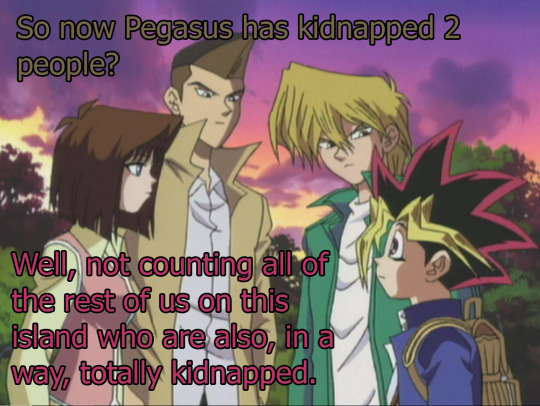
(more under the cut)
The Yugi gang has given up trying to find Mokuba, since while we’ve clarified that they’re very good at falling off of things, they’re maybe not so good at climbing up things--like a castle wall, for instance. So, they decide the best thing to do is to just get enough chips to save one Mokuba, and one soul of Yugi’s grandpa (which I guess he’s just planning to store in a bottle or something, so he can carry it around on his necklace next to to the other soul)
Meanwhile, Mei is enjoying our matte painter’s handiwork who was channeling Thomas Kinkade to fit in almost every color here except for blue (the actual color of a sky). I just want to note that it takes some guts to make your ocean blood red in a kid’s show. Then again, this is Yugioh, and if they didn’t shy away from an actual corpse last episode I guess a romantic blood ocean is fine.
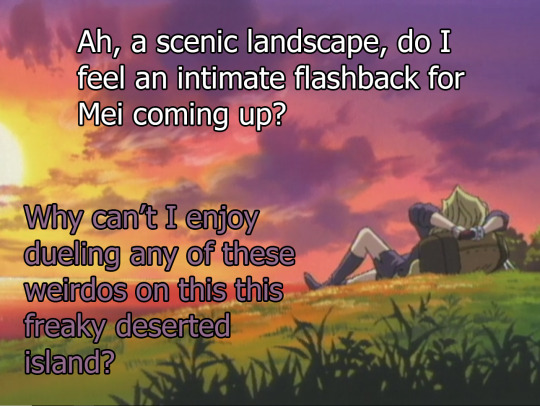
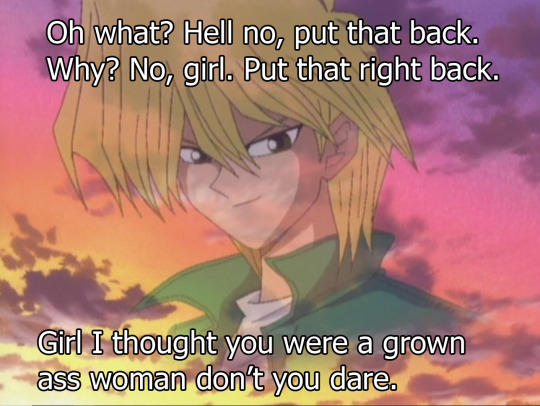
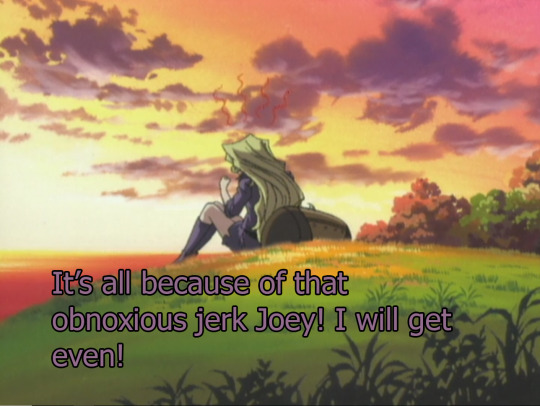
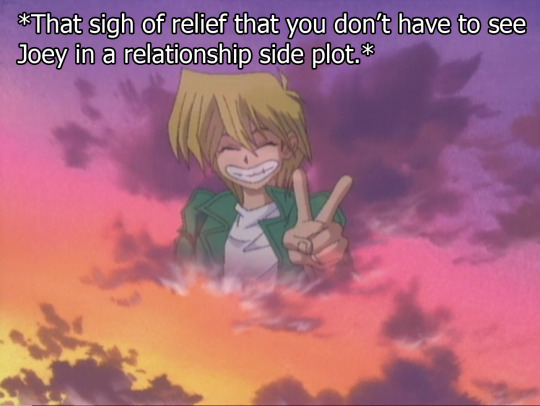
She’s dreaming about Joey, which is a terrible thought and no one woman should have to dream about Joey, but she is dreaming about killing Joey so that’s better, at least. I’ve been thankful for the general lack of romance plots in this show, and while I know such a longstanding show can’t possibly be void of them I just...none of these characters are really attractive, I’ll put it that way.
Which is something that Mei has noticed as well, because her last encounter finally got the nerve to show up and demand some retribution for that time that he got seduced by someone way older than him.
Although I’m starting think...maybe Rex is older than her? It’s very hard to tell, he’s like in between either an aging trucker or a middle schooler who died his hair a very gray shade of purple.
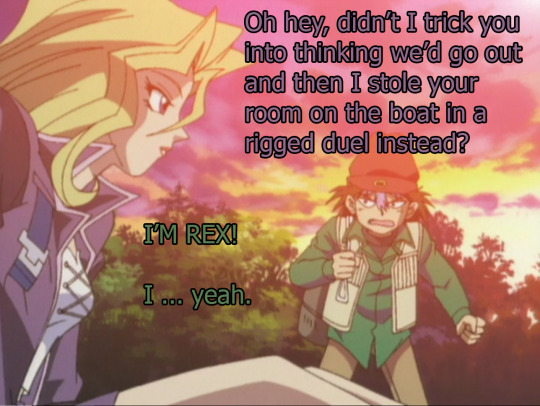
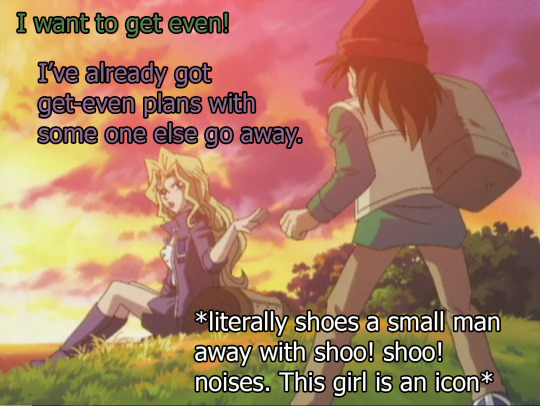
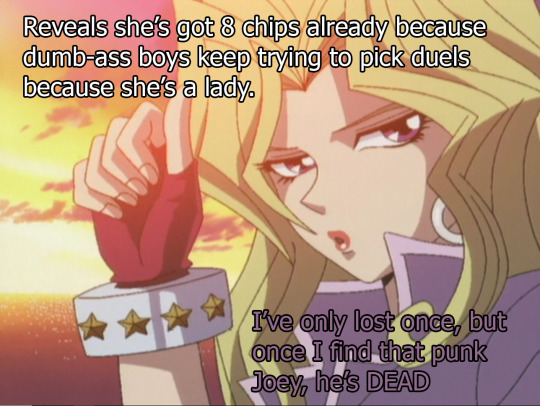
I didn’t think I’d actually like Mei, since I figured she was just there to be some eye candy villain, but her development is kind of interesting. As a girl who plays games I kind of hate the gamer girl trope, since girls are all very different and very unique and shouldn’t be clumped together in one stereotype because they share one hobby. But, Mei doesn’t actually want to dwell on the negatives of being one of the only girls on this island who plays games. Instead, she’s taken her situation and made the most of it, taking the chips from the dumb boys that were picking on her, and then fooling Rex into giving her what she wants for the second time in 24 hours.
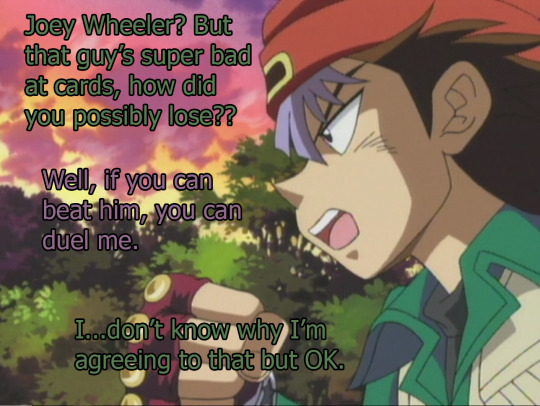
It is so random what strings this show decides to tie nicely into a bow, and which they leave hanging. That one-off joke where Mei tricked a guy into loosing his room has now come full circle. How no one else in all these years was able to solve this puzzle necklace except for this extremely short child eh not important yet.
Yugi decides to take a break from dueling, and they walk Joey over to the small-time baby arena, where the easy duelers are: the duelers that aren’t zombies or fish gods or egyptian gods. They honestly should have just started here in the first place.
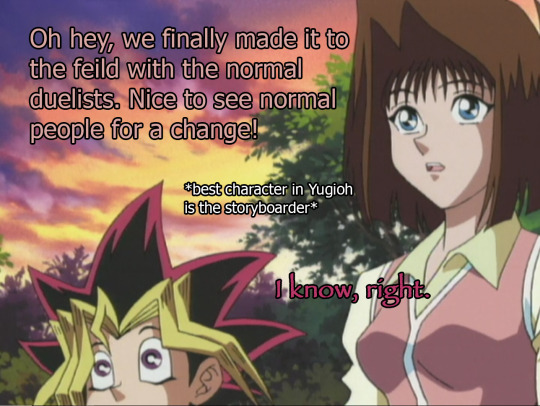
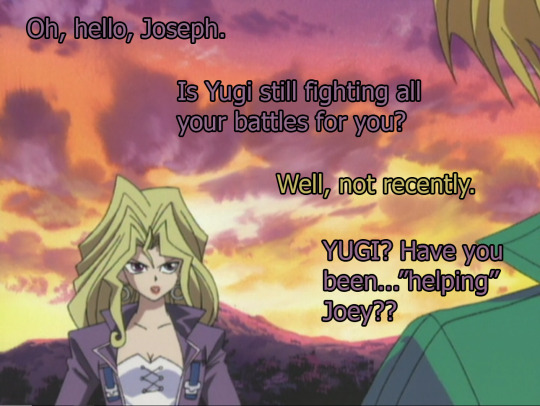
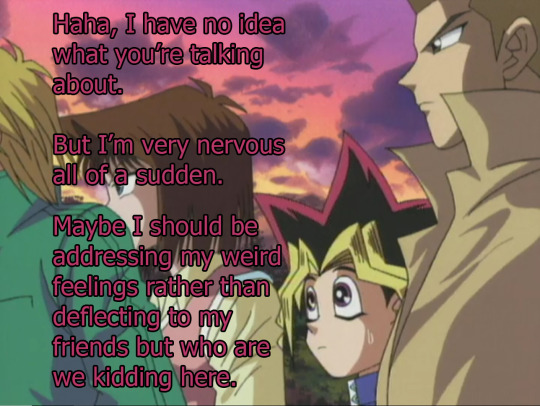
Yugi is the dictionary definition of “I have a million problems so I’ll solve everyone else’s because I don’t know what the hell is wrong with me” and it is pretty tragic since his version of helping is accidentally using psychic powers without his full control. Personally I’m very much looking forward to to small Yugi finally going full Elsa on us but alas that will be a different episode.
Now I used to think this psychic intervention was the sole reason that Joey was kind of an idiot but this entire episode was devoted to the real reason Joey is a dummy: because he secretly hasn’t solved any of his own problems his whole life because his friends figure he just can’t do it himself.
They’re probably not wrong.
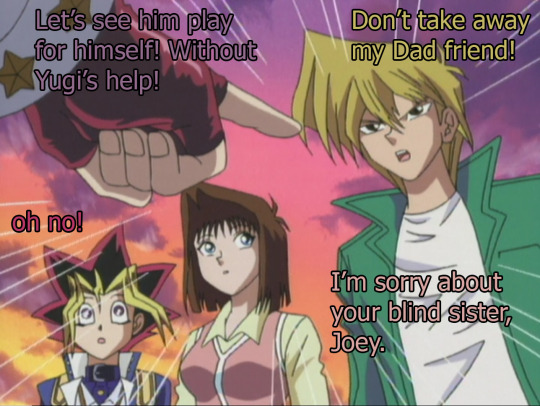
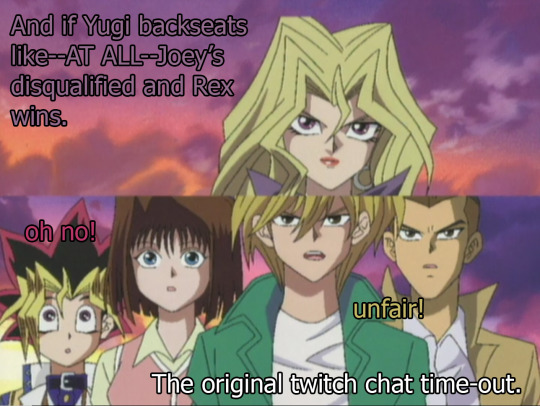
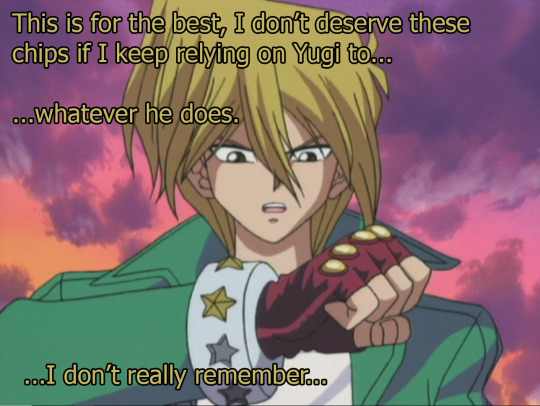
Tristan, who is either 12 or 21 (not sure) seems to be the only person here who realizes they don’t actually have to do anything she says. Like they can just play like normal and it doesn’t have to be to Rex. But Tristan beelined for the weirdest way to approach the situation and so it sort of locked Joey into a tantrum.
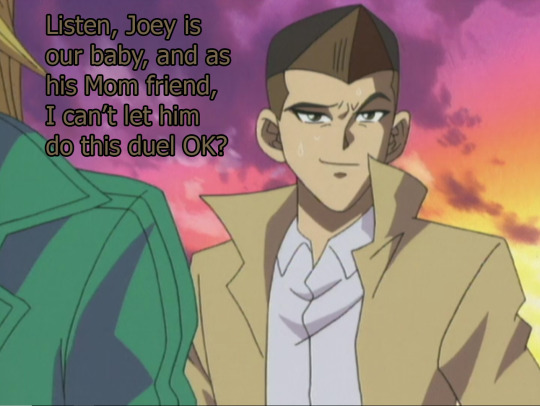
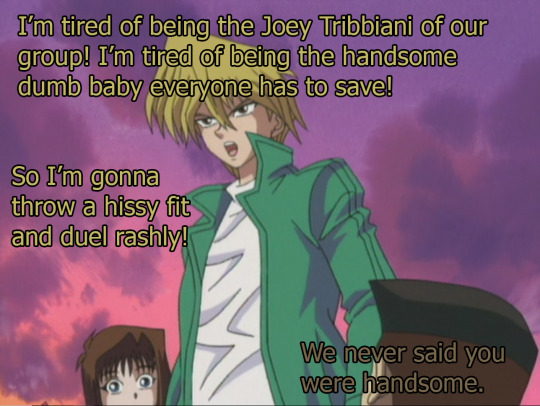
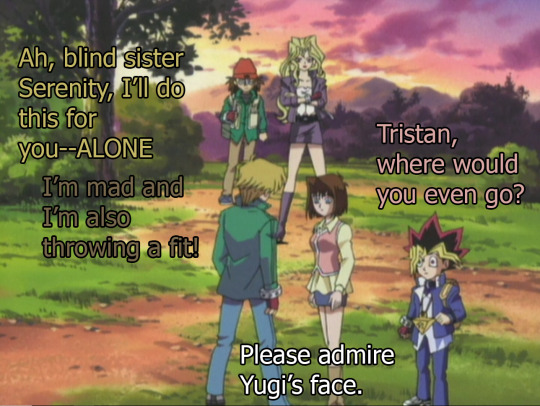
I mentioned this before but these kids need an adult. Mei really didn’t have to do anything to get them to start falling apart, and if it wasn’t for Yugi accidentally turning into an adult every other episode they wouldn’t have even managed getting lunch let alone getting here.
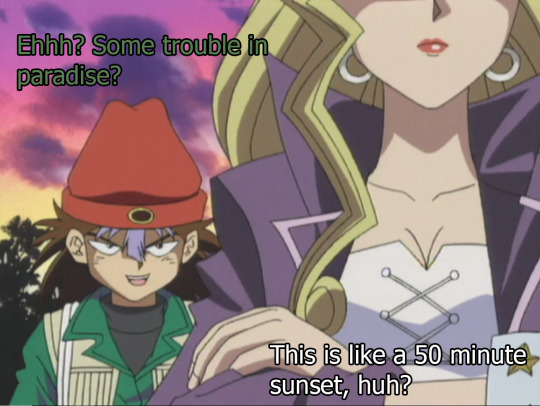
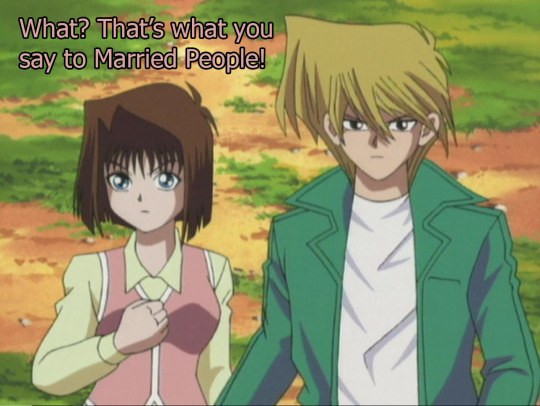
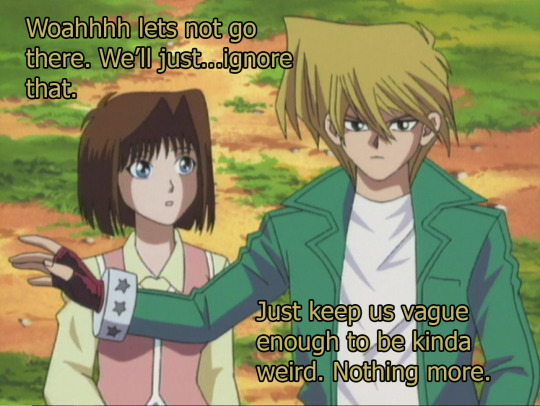
So they start the battle, while Tristan runs off in a hissy fit and Tea kinda cheers from the side kinda useless, as she usually does. Meanwhile, this very aggressive sunset is still full force, and it’s starting to look like the Second Coming is rolling out over Isreal in the background but our main characters are like “not right now, Jo, I’m playing cards”
I’m sure there’s more symbolism I could squeeze out of it, about how it’s the sun setting on Joey relying on his friends (although I doubt he will ever stop doing that) or the sun setting on Tristan and Yugi trying to be Joey’s substitute parents (although I doubt they will ever stop doing that) or how it’s supposed to make us think this is the end of Joey’s run in the tournament, but honestly...it’s night time now.
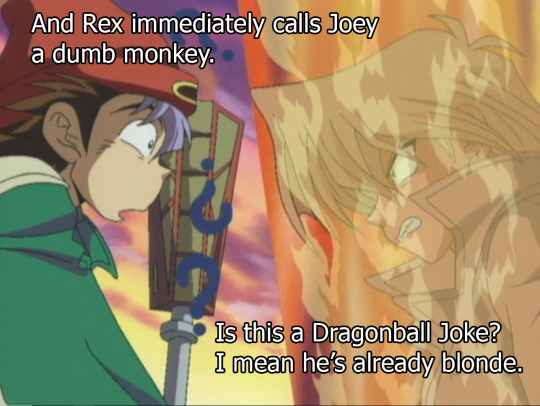
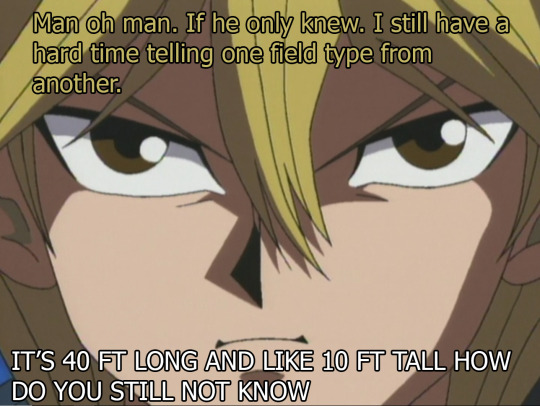
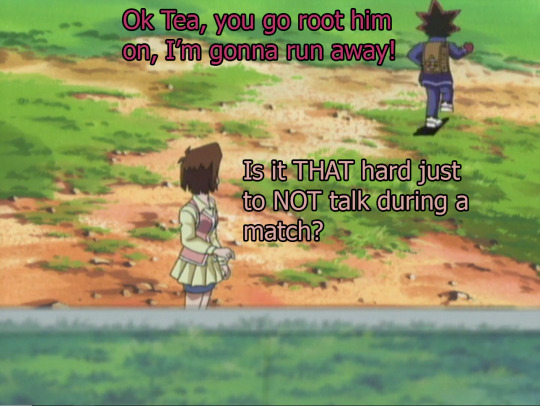
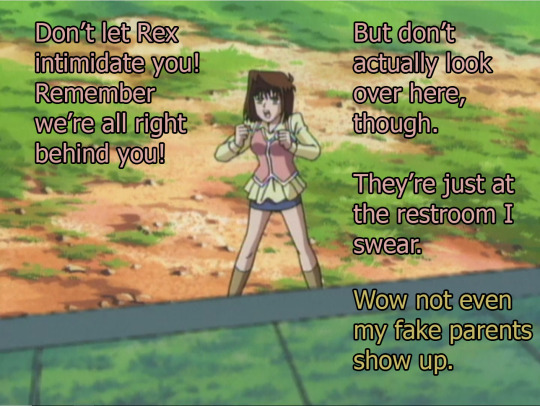
Maybe Tea does have a purpose, as a stand in for Joey’s sister? Tristan literally called Joey his baby, and Yugi’s acting like he’s sent his kid off to kindergarten for the first time. So, her staying behind while Yugi and Tristan brawl it out is like a mini divorce parallel, and kind of weird in this show about cards.
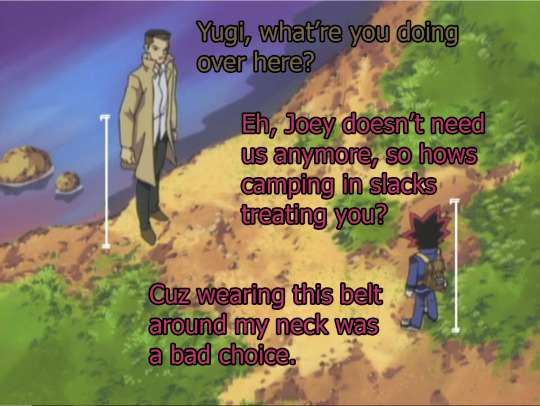
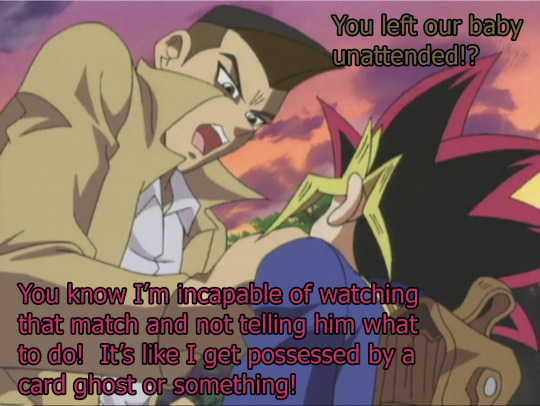
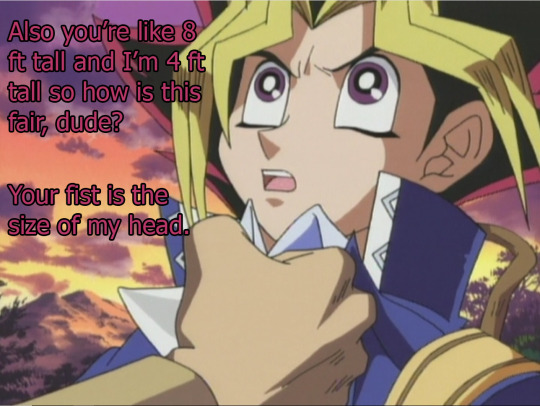
Tristan has to face facts that he doesn’t have enough faith in his proto-son, and needs to go and at least pretend that Joey can win, and be OK if he actually doesn’t win. I see that problem a lot in parents. Just let your kids loose. It’s kinda fun even. Yugi has to face some facts as well but there are too many to list.
But don’t worry, it gets weirder. As Joey is pulling cards from his deck, he sees the card that Tristan gave him at the beginning of the episode. Then, he recalls a memory that is--colorwise: a sweet relief from our very orange-purple sunset but otherwise: ...
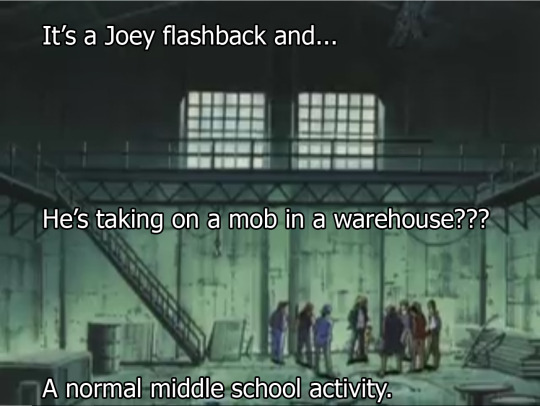
What the hell is he doing in this abandoned warehouse!? Joey and his friends go to the same school as a Robber Baron so I have a hard time believing that they also spend their time in warehouses.
But even weirder than Joey deciding to save a very small child in a warehouse from 8 gang members, is that Tristan, smelling that his friend is in danger from miles away has run through the rain, found this abandoned warehouse, and is ready to do a murder on all 8 of those gang members
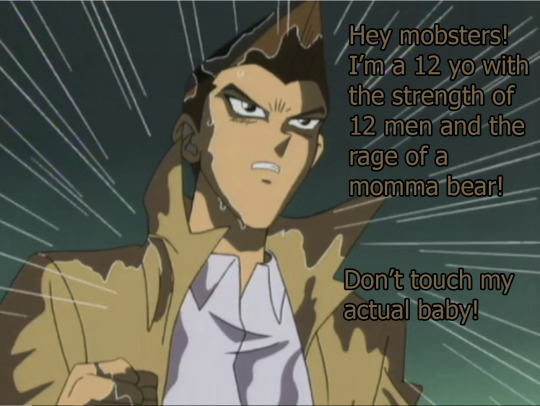
Well, doesn’t this suck for Mokuba that Tristan can’t duplicate this brute strength now?
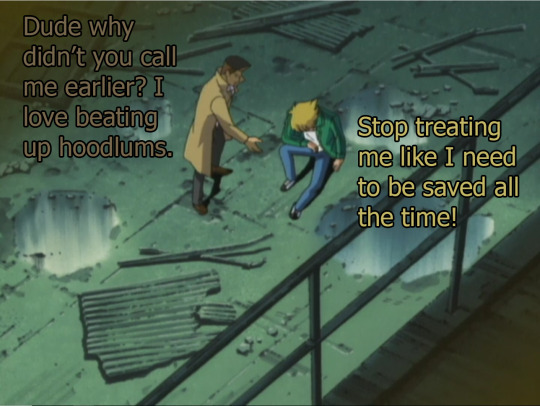
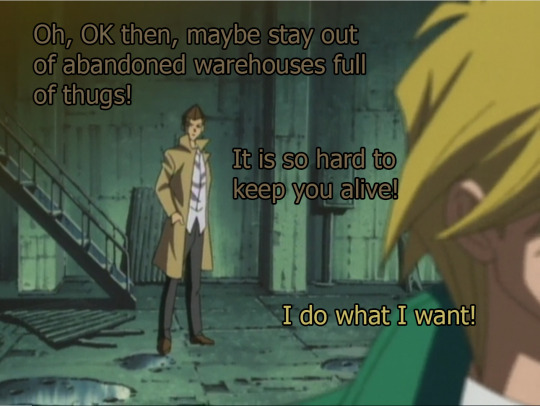
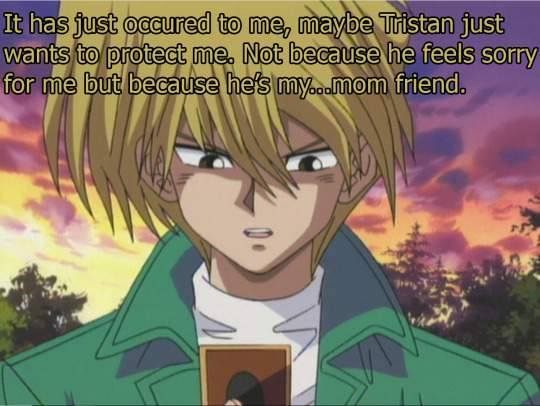
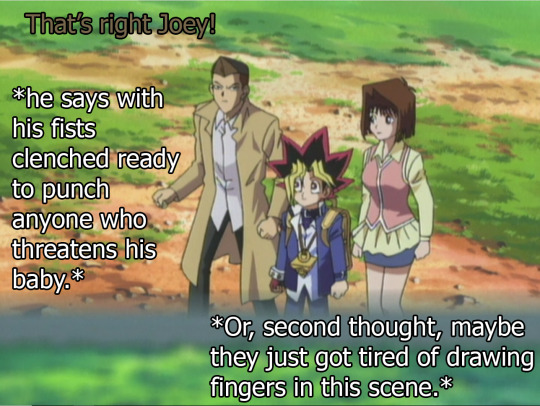
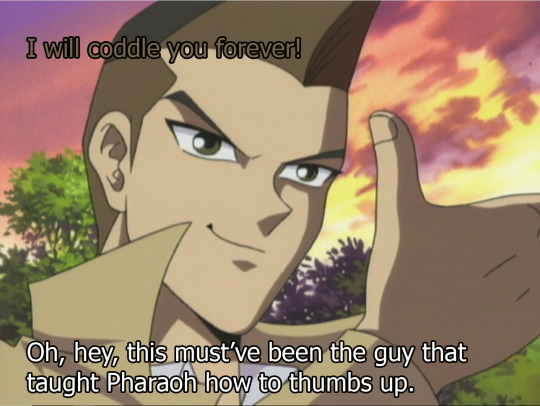
And so we end about where we began: Joey uses a card that Tristan put into his deck, as a symbol of their style of friendship where Joey screws up and then Tristan punches people. The duel isn’t over, but the parents are back together, and the writers for Tea breathe a sigh of relief because they had run out of ideas of things that she would say in the absence of everyone else.
Next Week, On Yugioh: Can Yugi actually go 10 minutes without backseat gaming? Will the Sun Ever Set? Does Tristan ever take off that city trench coat in this very thick forest? And, finally, did they even bring camping gear?
25 notes
·
View notes
Photo
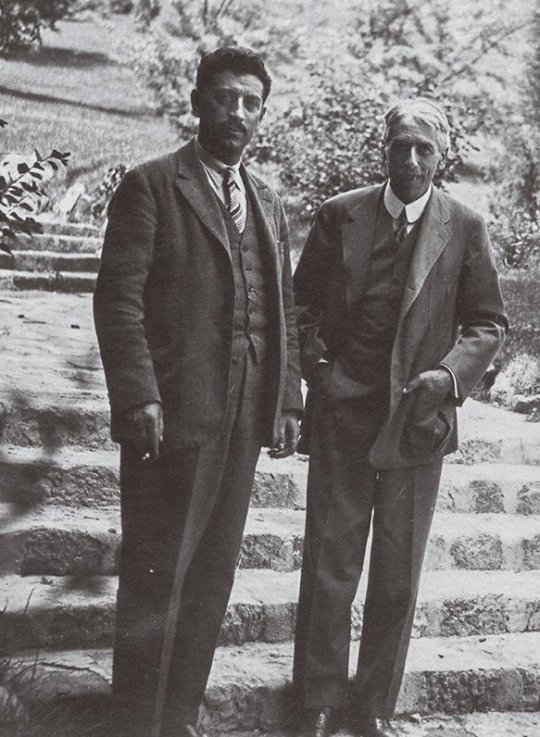
The love story of Baron Franz Nopcsa and Bajazid Elmaz Doda
Bajazid Elmaz Doda was born ca. 1888 in the mountain village of Shtirovica in Upper Reka (Reka e Epërme / Gorna Reka) region of western Macedonia. Like many young men from Reka, he left the mountains and emigrated to Romania in search of work. In Bucharest on 20 November 1906, he met the noted Hungarian scholar, Baron Franz Nopcsa (1877-1933), who hired the eighteen-year-old lad as his servant.
This relationship evolved into a love affair and a long-term domestic partnership. In his memoirs, published in German in 2001 under the title Reisen in den Balkan (Travels in the Balkans), Nopcsa describes his first meeting with his young lover, disguised as his private secretary:
"On 20 November 1906, in Bucharest, I met Bajazid Doda. Since that time, Bajazid has been with me and, since the death of Louis Draškovic, he has been the only person who has truly loved me and in whom I had full confidence, never doubting for a moment that he would misuse my trust. He of course had his failing, but I was more than willing to put up with them. The Serbs murdered Bajazid's father and brother in 1913 out of hatred for everything Austro- Hungarian, and in particular out of hatred for me, because I was active in Albania."
From Bucharest, Nopcsa and his young servant travelled to the Nopcsa family estate in Szacsal (Sacel) near Hatzeg in Transylvania and, several months later, on to London where Bajazid caught influenza. In mid November 1907, the two journeyed to Shkodra where Nopcsa had a house in 1907-1910 and from October 1913 onwards. They carried on over the mountains of Mirdita to Kalis where they were taken hostage by the notorious robber Mustafa Lita. After their release in Prizren, they travelled to Skopje and no doubt on to the upper Reka valley, as originally planned. They then returned to Shkodra in order to explore the territory of the Hoti and Gruda tribes.
In the years before and during the Balkan Wars, Nopcsa and his temperamental Albanian secretary travelled throughout northern Albanian, Kosova and Macedonia. In the autumn of 1913, Nopcsa reported:
"Once, when Nikol Gega and Bajazid, in a fit of sudden fury, seized their revolvers and were only prevented from killing one another by the intervention of Gjok Prenga and Mehmet Zeneli, I was able to arbitrate to the detriment of neither, and make peace between them so that they were eventually reconciled. Many Europeans were amazed at how I was able to keep all these very different characters together, who like all Albanians incline to envy and jealousy... From Shkodra, once I had put my household affairs in order, I set off for the mountains. My plan was firstly to climb the southern slopes of the northern Albanian Alps and then the area just west of the Prokletije, the Accursed Mountains. Due to malaria, however, I was obliged to abandon this part of my plan and limited myself to the upland parts of Kastrati which were easier to scale. Bajazid scaled Mount Veleçik, the Kunora e Keneshdolit and some other mountains in my place and took the photographs needed for the topographical maps of the northern Albanian Alps."
In the war years, 1915-1916, Nopcsa took his secretary with him while he was serving with Austro-Hungarian troops in Kosova. After the First World War, Bajazid Elmaz Doda and Franz Nopcsa lived mostly in Vienna, where the Hungarian scholar published several works of note, and enjoyed fame as a specialist not only in Albanian studies, but also in palaeontology and geology.
On 25 April 1933, Baron Nopcsa, who had long been suffering from depression, committed suicide by shooting himself in the mouth. Just before his death, he shot his faithful secretary and partner, Bajazid Doda. In a suicide note to the police, Nopcsa confirmed:
"The reason for my suicide is my nervous system which is at its end. The fact that I killed my long-term friend and secretary, Mr Bajazid Elmaz Doda, in his sleep, without him having an inkling as to what was going in, was because I did not want to leave him behind sick, in misery and in poverty because since he could have suffered too much. I wish to be cremated."
Bajazid Elmaz Doda is the author of the book Albanisches Bauerleben im oberen Rekatal bei Dibra (Makedonien), [Albanian Peasant Life in the Upper Reka Valley near Dibra (Macedonia)], that he completed as a typescript in Vienna in April 1914 and that was finally published in Vienna in 2007. The original typescript and the 2007 edition are accompanied by photographs taken, according to the author, by Doda himself. They are probably from the year 1907. The pictures are primarily of the author's native village of Shtirovica and surroundings, though there are also two photos of Skopje. This photo material is of particular historical value because the village in question has disappeared - nothing remained but a grassy meadow and a few piles of stones. Its native Albanian inhabitants were expelled from the Reka valley by Bulgarian troops in about 1916.
The book "Albanian Peasant Life in the Upper Reka Valley near Dibra (Macedonia)" contains a wide range of material and information on various fields and should prove useful for many subjects of research. It would also seem to be the first ethnological study ever written in German by an Albanian. Doda explains his objectives in a preface:
“During the Turkish period, my homeland, the Upper Reka Valley, was isolated from the outside world due to a short- sighted policy aimed at propping up a barbaric regime. As a result of recent events, it has come under Serb rule, and it is now to be feared that the Muslim element in Upper Reka, in view of its traditional isolation, will vanish and leave no trace. The purpose of this book describing the life of the Muslims in the Upper Reka Valley is to counter this trend, to help my fellow Muslim villagers preserve their identity, and to create a lasting monument among the publications dealing with Albania. What Spiridion Gopcevic has to say about Reka in his notorious book on Macedonia (Makedonien und Alt-Serbien, 1889) is all tendentious lies, something which has been noted by other travellers before me. I did not intend to write an academic treatise on ethnography or some serious dissertation, but simply to describe this part of the world as I experienced it myself on a daily basis. When those who exterminated the Albanians in the region of Nish [Niš] have also wiped out my people, the simplest accurate description of their daily life will suffice to serve both as a permanent monument to their one-time existence and as an indictment to those who annihilated them.”
113 notes
·
View notes
Photo
I do appreciate that you are engaging in a civil discussion about this topic because I always enjoy conversations like these and feel like they should be had within the fandom, especially surrounding such an intelligent show. I hope you understand that my comment to your original post was not a personal attack on you or a direct attack on your ideas regarding the subject matter, as I did agree with you to a degree.
I just wanted to offer my opinion and open up the conversation. I'm glad you cleared up the fact that you do want a redemption arc for Kuvira and not just an immediate one. I'm sorry if I didn't register that from your original post. I think I was mostly focused so much on Kuvira trying to defend her actions as "for the good of the people"... this quote fits the situation:
"Of all tyrannies, a tyranny sincerely exercised for the good of its victims may be the most oppressive
It would be better to live under robber barons than under omnipotent moral busybodies.
The robber baron's cruelty may sometimes sleep, but those who torment us for our own good will torment us without end for they do so with the approval of their own conscience.”
C.S. Lewis. Kuvira still gives the impression that she doesn't understand that what she did was wrong, no matter what original motive she had. That's what I have s problem with. That's what she needs to get over to redeem herself.
@xaibaugrove Thank you so much for talking to me civilly and not acting hostile towards me. I completely understood why some people disagreed with me. I mean it is normal to dislike Kuvira and/or any antagonist. I just find Kuvira to be a complex character and someone I liked as an antagonist. There have been arguments for and against Kuvira when Book 4 originally came out.
Some pointed out that Kuvira was being inconsistent even as a villain and perhaps Bryke just swapped stuff onto her so that she looks like a traditional villain. I agreed with that analyses because Kuvira putting other types of benders into concentration camps was kinda unlike her as someone pointed out that one of her first scenes involved using the aid of a fire bending soldier (or someone in her team had that power) .
So, I could understand the frustrations. To me, In LOK the best characterised villain was Amon. I mean he was very well defined and despite there still being flaws I think he executed things very well as a villain. After him, it was Kuvira who mostly stood that test to an extent. So, I am just saying that any criticism against and for Kuvira can be valid concerning that Kuvira is still a character in progress.
I laud the quote you put of C. S, Lewis. It made a lot of sense and I agree with it. Of course, attacking Republic City would in no way help Earth Kingdom in the long run but Kuvira thinking it would was one of her fatal flaws. The fact she so wanted the “good” of her people that she was ultimately hurting the same people she wanted to help is the irony of her and Amon’s characters.
Now, the reason I dislike Suyin’s behaviour is because since B3 Suyin always acted like she did nothing wrong. When she was younger she was part of criminal elements in Republic City. Due to her actions, Lin got a permanent scar on her face and she pretty much went unscathed. Now, Lin has never completely faced these problems with Suyin. Their mother Toph sent Su away and Lin was ultimately left bitter. Now, I question the handling of Lin;s problems because she has some right to be mad as in Su is also mad with Kuvira. Yes, the situation is not identical but they both entail feelings of personal betrayal and criminal activity. However, Lin is told that she is being “over-emotional” and that she should stop begrudging things as they all moved on her aside her. I felt that was not at all fair to Lin as a person. They could have given her a proper apology later on.
Now, Suyin has pretty much forgiven Bataar Jr despite the fact he was Kuvira’s right hand man. Then when Kuvira is acting upset and saying Suyin had betrayed her beforehand Suyin just denies that. The thing is even before Kuvira became a dictator Suyin was against Kuvira because Kuvira thought differently than her. Back then, Kuvira did nothing criminal at all. She brought back order and helped established peace in the Earth Kingdom. But everyone feared her influence politically and pretty much were against her.
They wanted Prince Wu to be the leader. This is an insult to anyone who did the work for so long and then was like, for political reasons, being pushed aside. Did Kuvira’s further actions seem justified in this light? No. Instead, of debating with the political council and stating how their favouritism and bias would ultimately hurt the Earth Kingdom and they should look beyond her and just accept she wants to help, she decided to turn tyrant. Obviously, that was in some ways spoiled. That part I can agree with @sunnyartsstudio That she decided to act spoiled when they didn’t elect her. But overall, I didn’t think she was spoiled.
It was when Suyin stated that this is a lie I have provided for you and given you a home that really bothered me. That is the bare minimum you can do for someone who is your ward. And, Kuvira paid it back in full when she was with them. She was the captain of their guards and helped save Korra and her father. When Kuvira stated she was never considered family she meant she never felt she could be intimate with them. That is partly true aside the times I see Kuvira doing her job or being in that metal bending flower dance for Suyin, I never see her at the table nor do I see her being part of the immediate family. She was not part of them. Even Asami could join Korra’s family for dinner in Turf Wars and in the beginning her parents didn’t know that Asami was Korra’s new girlfriend. I mean we can have people over for dinner but I just never saw Kuvira over and not even introduced as Suyin’s ward or anything. Felt kind of strange later on.
So, Kuvira may still be disillusioned but what she perhaps wants is to be acknowledged by Suyin and treated as a daughter than just merely a ward. I know that will be hard to do considering Kuvira’s crimes but she just wants I think Suyin to be her surrogate Mom and be alongside her. Unless, she is an evil person and is acting adamant and doesn’t acknowledge her crimes she will dealt with by Krew. Ultimately. Kuvira should know sorries will not fix what she has done but I think eventually she will. I think she might because of Korra caring about her as a person and saving her, going so far as to see Kuvira as her kindred and empathising with her in that manner. Though it all depends on how the comic will frame stuff and we disagree or agree.
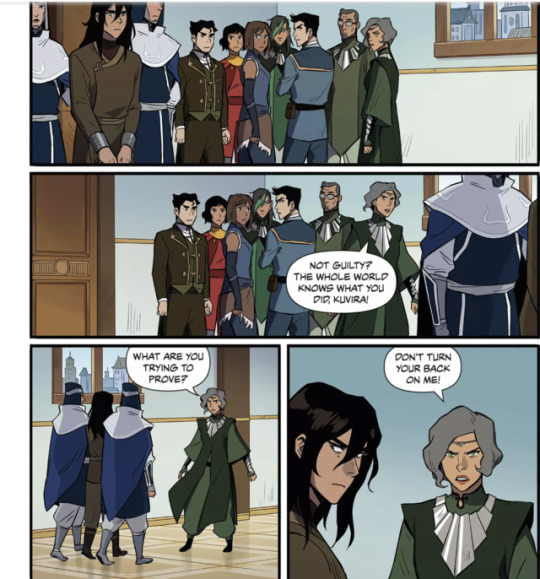
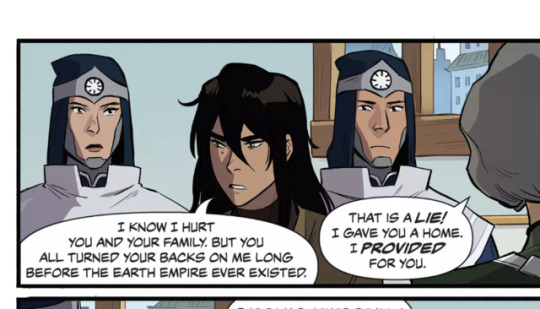
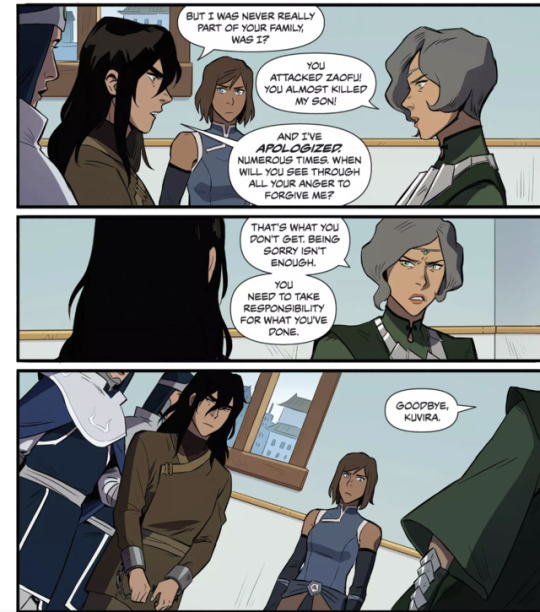
God. This scene was so painful. What really bothers me is that even though Kuvira did something wrong I do also understand that she is not being fairly put on trial. She did do good for the Earth Kingdom initially and yeah she is aware what she did later was wrong. But, should she only be judged for that? I am not saying to forgive everything but she is the person eligible for redemption. She did try and she was derailed. I wish someone would help Kuvira. And, you can see Korra wants to. That she is actually analysing the situation in a way that is not fully black and white.
(Su you forgave Bataar Jr for helping Kuvira make the damn weapon. So, yeah, you are being biased and just because you gave someone food doesn’t mean you treated them like family. Seriously, shut your elitist ass up)
Pics from here.
752 notes
·
View notes